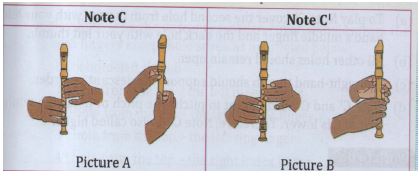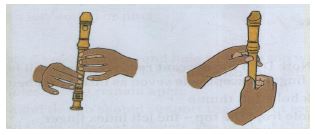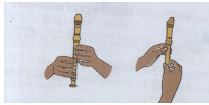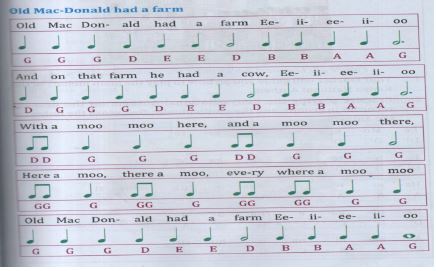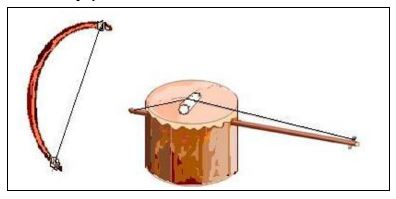Musya
Social Studies and Religious Education Questions And Answers - KCPE 2022 Past Papers
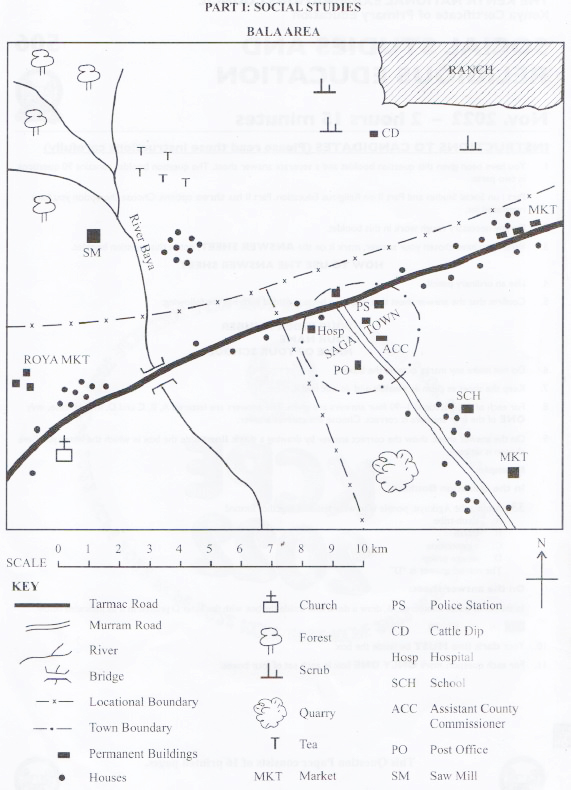
Study the map of Bala area and answer questions 1-7
- What is the direction of the quarry from the saw mill?
- North West.
- South West.
- South East
- North East.
- What is the approximate area of the ranch?
- 8 km2
- 10km2
- 18km2
- 12km2
- The climate to the North Western part of the map is likely to be
- hot and wet
- hot and dry
- cool and dry
- cool and wet.
- Which one of the following social activities is carried out in Saga town?
- Religion.
- Health.
- Recreation.
- Education.
- The following are economic activities carried out in Bala area except
- Trading
- Fishing
- Transport
- Farming.
- Settlements in Bala area are mainly influenced by
- transport
- climate
- trades
- farming
- Bala area is likely to be administered by
- Assistant Chief
- Chief
- Assistant County Commissioner
- County Commissioner.
- Which one of the following pre-historic site is matched with the country where it is found?
Pre-historic site Country A Rusinga Uganda. B Ntusi Kenya. C Omo Valley Ethiopia. D Olorgesailie Tanzania. - The time in Mogadishu 45° East is 9.00 p.m. What will be the time in El Aaiun 15° West? (v)
- 5.00 a.m.
- 5.00 p.m.
- 7.00 a.m.
- 7:00 p.m
- Which one of the following group of alcommunities consist of Semites?
- Nubians, Tigres, Arabs
- Dahalo, Rendille, Burji
- Pokomo, Taita, Abagusii
- Samburu, Njemps, Turkana
Use the diagram below to answer question 11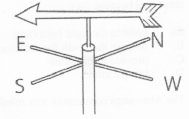
- The instrument shown above is used to measure
- direction of wind
- speed of wind
- atmospheric pressure
- humidity.
- The following are mountains in Africa
- Atlas
- Elgon
- Cape ranges
- Ruwenzori
- Kilimanjaro
- Usambara
Which combination of mountains below were formed through faulting?- (i) and (v)
- (ii) and (v)
- (iv) and (vi)
- (iii) and (vi)
- Which one of the following relief feature is matched with its characteristic?
Feature Characteristic A Plateau many highlands B Rift valley resulted from vulcanicity C Lake Basin receives convectional rainfall D Lowlands as a result of sinking - Some taboos in African communities are preserved becauyse they;
- enforce the right behaviour
- prepare the youth for adulthood
- provide information
- bring fortune
- The Abawanga community was ruled by
- Council of elders
- Emperors
- Chiefs
- Kings
- The following factors influence population distribution in Africa
- war
- fertile soils
- relief
- diseases
- urbanisation
Which one of the following combination of factors influence sparse population?- (ii), (iv)
- (iv), (v)
- (i), (iv)
- (i), (ii)
- Below are characteristics of a certain type of soil
- has large particles
- does not hold water
- has loose particles
- has coarse grains
The type of soil described above is- clay
- loam
- alluvial
- sand
- Which one of the following is not a basic need o a family?
- Water
- Shelter
- Friends
- Clothing
Study the table below and answer question 19
Month J F M A M J J A S O N D Rainfall
(mm)41 68 150 230 206 114 66 84 193 226 150 150 Temperature
(°C)23 23 22 22 22 21 21 22 24 24 24 24
- Which of the following statements is true about the climatic region represented in the table above?
- It receives high rainfall when temperatures are low
- The highest rainfall is received in April
- It is hot and dry all the year round
- It receives low rainfall when temperatures are low.
- The following statements are characteristics of a poultry keeping method
- litter is spread on the floor
- light is provided
- feeds are provided
- eggs are collected from the littered floor
The method described above is- free range
- battery cage
- deep litter
- fold
- Which one of the following is not a function of "Njuri Ncheke" among the Jom Ameru?
- Officiate religious ceremonies.
- Punish law breakers.
- Pay dowry.
- Organise trade.
- Who among the following was the King aalin the Buganda kingdom?
- Katikiro.
- Omulamuzi.
- Kabaka.
- Bataka.
- Joshua has found his friend smoking smarijuana in the school toilet. What would be the right action to take?
- Inform other classmates.
- Throw the substance in the toilet.
- Keep quiet about it.
- Report to the head teacher.
- Which one of the following group of goods consist of Kenya's imports only?
- Crude oil, Coffee, Diatomite
- Sisal, Medicine, Soda ash
- Fertilisers, Machinery, Vehicles
- Animal feeds, Soda Ash, Vegetables
- Population density in urban centres in Africa is mainly influenced by
- recreation
- employment
- transport
- education.
- Peace in schools is mostly undermined by
- unemployment of parents
- absenteeism from school
- oppression by the school administration
- betrayal by friends.
Use the map of Africa below to answer questions 27 to 30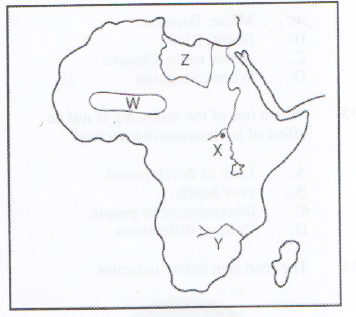
- The main benefit of the River project marked Y is
- control flooding
- expansion of industries
- increase in food production
- tourist attraction.
- The main economic activity in the region marked W is
- pastoralism
- mining
- forestry
- tourism.
- The colonial power that ruled the country marked Z was
- Britain
- France
- Italy
- Germany.
- The city marked X is called
- Cairo
- Addis Ababa
- Mogadishu
- Khartoum.
- Three of the following are factors that favour dairy farming in Kenya. Which one does not?
- Large farms.
- Cool temperatures.
- Large market.
- Plenty of water.
- Which one of the group of crops in Kenya below consists of traditional food?
- Maize, Bananas
- Beans, Rice
- Arrow roots, Cassava
- Wheat, Sorghum
- Which one of the following is not an effect of lawlessness in a society?
- Lack of development.
- Poor health.
- Development of people.
- Cultural differences.
- The road sign below indicates
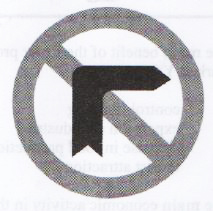
- no right turn
- no left turn
- turn right
- no entry.
- The formation of the Grand Coalition Government in Kenya in 2008 resulted in
- formation of the new constitution
- creation of the post of Prime Minister
- President working under Prime Minister
- Merging of the Party of National Unity (PNU) and Orange Democratic Movement (ODM).
- The best method to resolve conflicts among family members is
- litigation
- mediation
- negotiation
- peace making
- Mary was asked by her teacher to name a staple food crop grown both in Kenya and Tanzania. What would be the correct response?
- Sorghum.
- Maize.
- Bananas.
- Millet.
- Which one of the following minerals is mainly used for making ornaments?
- Marble
- Gemstone
- Diatomite
- Titanium.
- John visited Nairobi National Park and noticed that it had an electric fence. The main reason for the fence was to
- prevent animal and human conflicts
- confine the animals together for the tourists to see
- make animals live with one
- make it easy for game wardens to stimote feed them.
- Bob was going to school and had to cross a busy road. What action would be safe for him?
- Shout at the driver to stop.
- Look right, left, right and cross the road.
- Cross the road at high speed.
- Cross the road when it is clear.
- The following statements describe a crop grown in Africa.
- It originated from Indonesia.
- It is grown in coastal areas.
- It is exported to India.
- It is used to make perfumes.
The crop described above is- cocoa
- coffee
- tea
- cloves.
- Which one of the following events came last in the attainment of independence in Kenya?
- Formation of KANU.
- The second Lancaster House conference.
- The release of Jomo Kenyatta.
- Formation of KADU.
- The location of service industry is mainly influenced by availability of
- raw material
- land
- market
- labour.
- The most commonly used means of communication in Eastern Africa today is
- letters
- messengers
- telefax
- mobile phones.
- Members of the 4K club discussed and agreed to visit Tsavo National Park. What type of democracy did they exercise?
- Indirect.
- Direct.
- Representative.
- Delegative.
- Which one of the following vegetation is found in the mediterranean zone?
- Pine and cork.
- Camphor and Ebony.
- Baobab and Acacia.
- Cactus and Euphorbia.
- Which one of the statements below describe the difference in population structure of Kenya and India?
- There are more young people than adults in both countries.
- The percentage of males in Kenya mid it is higher than in India.
- Death rate is higher in India than in Kenya.
- Life expectancy is higher in India
- The main benefit of tourism in Africa is that, it leads
- conservation of wildlife
- preservation of culture
- improvement of security
- earning foreign exchange.
- The following statements describe the importance of moral values in the society. Which one does not?
- People live in peace.
- People live in good health.
- People use property of others.
- People are honest.
- Which one of the following statements describes the composition of the Senate in Kenya?
- Has 290 members representing constituencies.
- Has 16 women nominated by political parties.
- Has 5 members representing Instum people with disability.
- Has 47 elected women representatives
- The following statements are some benefits of settlement schemes in Kenya. Which one is not?
- Had low food production.
- Utilises the land.but
- Brought unity among people.
- Created employment.
- Which one of the following is a civil right?
- Right to marry.
- Right to vote.
- Right to education.
- Right to speak.
- The statements below describe similarities of horticultural farming between Kenya and Netherlands. Which one is not true?
- Little capital is invested.
- Greenhouses are used.
- Farms are small.
- Fruits and flowers are grown.
- Which one of the following UN agencies promotes research in agriculture and forestry?
- United Nations Education Scientific and Cultural Organisation (UNESCO).
- Food and Agricultural Organisation (FAO).
- United Nations Environmental Programme (UNEP).
- World Health Organization (WHO)
- Referendum is an occasion when people vote for
- members of a County Assembly
- members of Parliament
- the President
- change in the constitution.
- Rose was asked by her teacher to give one cause of rural-rural migration. Her correct response was
- resettlement by government
- retirement from employment
- availability of employment
- availability of social amenities.
- Which one of the following arm of the government implements policies?
- Senate
- Judiciary
- National Assembly
- Executive
- Who among the following qualifies to be a citizen of Kenya by birth?
- a person married to a Kenyan citizen for eight years
- a child born in another country and adopted by a Kenyan
- a child of eight years found in the country whose nationality is not known
- a person living in Kenya for eight years
- The following were elected members in Kenya
- Members representing the counties.
- Members representing the Sanol constituencies.
- Women representing the counties.
The above members form the- National Assembly
- Parliaments
- County Assembly
- Senate
- Below is the structure of the court system in Kenya
SUPREME COURT ↓ X ↓ HIGH COURT ↓ MAGISTRATE COURT
The court level marked X is- court martial
- kadhis court
- court of appeal
- juvenile court
PART II: RELIGIOUS EDUCATION SECTION
CHRISTIAN RELIGIOUS EDUCATIO
- Which one of the following is a duty given to human beings by God in the Genesis stories of creation? To
- cultivate the garden.
- kill snakes in the garden.
- eat fruits in the garden.asb
- build altars for God.
- Abraham showed his obedience to God when he
- carried his nephew Lot with him
- went to Egypt to look for food
- interceded for Lot who was in Sodom
- was willing to offer his son as a sacrifice.
- A lesson Christians learn from the story of Joseph in prison is that they should
- interpret dreams
- avoid getting into trouble
- be willing to suffer for their faith
- forgive their enemies
- God saved the Israelites from slavery inEgypt mainly because
- Moses has asked hom to do so
- He had heard their cry
- He wanted to prove his power to the Egyptian
- He wanted them to worship him.
- During the call of Moses, the presence of God was manifested by the
- thunder
- lightning
- burning bush
- smoking torch
- A lesson Christians learn from the incident in wich Ahab took Naboth's vineyard is to
- be contented with what they have
- exercise their power over their subjects
- consult thier friends when they are in trouble
- carefully guard their properties.
- A virtue that was demonstrated by Jonanthan when he defended David from King Saul is
- patience
- humility
- honesty
- loyalty
- The Prophet who foretold that the messiah would be the suffering servant is prophet
- Elijah
- Elisha
- Isaiah
- Micah
- Prophet Elisha rewarded the rich woman from Shunem from being kinf to him by
- telling the KIng about her
- increasing her oil
- giving her gifts
- telling her that she will get a son
- Which one of the following statements was said by Simeon during the dedication of Jesus in the temple
- "He will be a great man in the Lord's sight."
- "With my own eyes I haver seen your salvation."
- He will be great and will be called the son of the most high."
- "He will be filled wiht the Holy Spirit and bring back many people to God."
- The reason why King Herod wanted to kill baby Jesus was because
- the parents of Jesus had refused to undergo the cleansing ceremony
- the parents of Jesus had not been registered during the census
- He discovered the wise men had lied to him
- he feared that Jesus would take over the throne
- Jesus chose the twelve disciples because he mainly wanted them to
- preach the gospel
- keep him company
- have many friends
- defend him from his enemies
- From the story of the rich man and Lazarus , Christians learn that
- the needy should work hard to get wealth
- the needy will be rewarded in heaven
- wealthy should be shared with the needy
- the rich people wil go to hell
- A parable of Jesus that teaches Christians to bring the fallen members back to church is the parable of the
- good Samaritan
- lost son
- widow and the judge
- sower.
- A miracle that was performed by both Jesus and Peter is the miracle of to
- changing water into wine
- calming the storm
- raising the dead
- feeding of the five thousand people
- A value Christians acquire from the incident when Jesus washed his disciples feet is
- tolerance
- cooperation
- courage
- humility.
- Who among the following people visited the tomb of Jesus early in the morning to anoint his body with spices?
- Mary Magdalene and Salome.
- Mary and Elizabeth.
- Peter and John.
- Joseph of Arimathea and Nicodemus.
- Which one of the following statements about Jesus is found in the Apostle's creed? Jesus will
- send the Holy Spirit as a helper
- come to judge the living and the dead
- face opposition from many people
- be called a wonderful counsellor.
- Acquilla and Priscilla welcomed Paul into their home during his missionary journey. Which one of the following qualities did they demonstrate?
- Responsibility.
- Obedience.
- Perseverance.
- Kindness.
- The main virtue that was demonstrated by Jacob when he worked for fourteen years to get married to Rachel is
- patience
- humility
- respect
- cooperation.
- People in traditional African communities express their gratitude to God mainly by
- paying tithes bar
- pouring libation
- making sacrifice
- doing charitable activities.
- Which one of the following funeral practices in traditional African Communities shows that there is belief in life after death?
- Burying the dead with belongings.
- Shaving the hair of the mourners.
- Feasting and drinking by mourners.
- Wailing and mourning.
- In traditional African communities the youth are taught moral values by
- involving them in the community
- punishing the wrongdoers
- setting good examples of them to emulate
- ttelling them folktales
- Which one of the following practices in traditional African community shows that the life of the unborn is important?
- Giving an expectant mother special food valevol
- Shaving the hair of an expectant
- Constructing a shelter for the unborn
- Buying gifts for the unborn
- The main reason why Christians should obey their leaders is because
- those who disobey their leaders are punished
- obeying leaders reduces conflicts in the society
- authority comes from God
- the leaders reward good people.
- Patty, a Standard Six pupil, discovers that his deskmate Dan has been going without lunch because his parents cannot afford to buy for him. As a Christian what action should Patty take?
- Tell another friend to share his food with Dan
- Share some of his lunch with Dan.
- Tell his parents about Dan.
- Ignore Dan completely.
- Your friend Betty refuses to clean the table after meals saying that the work is for her elder sister. As a Christian what advice can you give Betty? Tell her
- to report the matter to her parents
- not to eat from the table
- request her sister to continue with er work
- the importance of cleanliness.
- Over the weekend Standard Eight candidates decided to visit an animal orphanage before the start of their final examination. This activity was important to the candidate because it
- enabled them to regain the lost energy
- enabled them to know different types of animals
- was necessary for the revision of their exam
- signified the end of primary education course.
- The chairperson of the drama club asks you to buy him a loaf of bread for him to put you on the list of those who are going for a trip. The correct action for you to take as a Christian is to
- ignore his request and leave the drama club
- accept and tell other friends about it
- refuse and report him to the drama of teacher
- buy him a loaf of bread and keep it a secret.
- Christians in Kenya are discouraged from engaging in gambling activities because
- it is illegal in Kenya
- it leads to wastage of family resources
- one might lose his friends
- it is not easy to win the bet.
with wealth. gaib boqiw
SECTION Ba
ISLAMIC RELIGIOUS EDUCATION
- A Surah that teaches Muslims about tawhid is
- An-Nasri 9au6ood at telewe B.
- An-Nas
- Al-Falaq
- Al-Ikhlas.
- Muslims recite Surah Al-Falaq and An-Nas when
- seeking protection from evil
- seeking for forgiveness from Allah
- thanking Allah for His blessings
- facing a challenging situation.
- The events of the year when the Prophet (P.b.u.h) was born are described in Surah
- Al-Kafirun
- Al-Lahab
- Al-Fiil
- Al-Quraish.
- Which one of the following is a lesson from Surah An-Nasr?
- Allah is eternal.
- Allah will punish evil doers.
- Allah protects people from evil.
- Allah forgives those who repent.
- "Walaa antum a'abiduuna maa 'abud" is a verse found in Surah
- Al-Kafirun
- Al-Zilzalah
- Al-Inshira
- Al-Kauthard
- The Prophet (P.b.u.h) said that "whoever is not thankful to people is not thankful to Allah". This hadith teaches Muslims to
- thank Allah for favours received.
- be thankful to people for their assistance.
- thank Allah first then thank people.
- avoid thanking people for favours received.
- According to Hadith of the Prophet (P.b.u.h), whoever believes in Allah (S.W) and the last day should not
- annoy his neighbour
- slander others
- take a bribe
- go astray.
- The best reason why Muslims perform swalat is because it
- teaches them about punctuality
- encourages cleanliness
- promotes Muslim brotherhood
- enables them to fulfil a commandment of Allah (S.W).
- Who among the following people qualifies to be given Zakat?
- An orphan.
- A traveller.
- A widow.
- A sick person.
- Naima forgot that she was fasting and drank some water. What should she do? She should
- continue fasting and compensate later
- pray two rakaats
- ask for forgiveness
- break her fast and compensate
- Muslims wear Ihram during Hajj to symbolise
- equality of all Muslims
- their love for Islam
- tolerance of other religions
- their peaceful nature.
- Which among the following parts are wiped during tayammum?
- Arms and feet.
- Arms and head.
- Face and arms.
- Face and feet.
- When Muslims want to succeed in whatever they have planned or wish to do, they should say
- Maashalah
- Jazakallah
- Astaghfirullah
- Insha-Allah.
- The best way for caring for people suffering from HIV/AIDS is by
- giving them medicine
- giving them food
- showing them love and care
- taking them to hospital.
- Which one of the following is an intoxicant?
- Miraa.
- Fermented milk.
- Vinegar.
- Sour porridge.
- Who among the following prophets was In the father of Nabi Yusuf?
- Nabi Ibrahim (A.S).
- Nabi Suleiman (A.S).
- Nabi Ayub (A.S).
- Nabi Yakub (A.S).
- Who among the following angels will blow the trumpet on the Day of Judgment?
- Israfil.
- Jibril.
- Malik.
- Ridhwan.
- Which one of the following is the correct order in which the scriptures were revealed?
- Zabur, Taurat, Injil, Quran.
- Zabur, Injil, Taurat, Quran.
- Taurat, Zabur, Injil, Quran.
- Taurat, Injil, Zabur, Quran.
- Which one of the following is a similarity of all the prophets of Allah?
- They all lived long lives.
- They were all treated kindly by their people.
- They were all given scriptures.
- They all came with the same message.
- Omar a Standard Six pupil finds his younger brother taking money from his mother's handbag without permission. The correct action for Omar to take is to
- tell his brother that stealing is wrong
- ask his brother to share the money with him
- ignore his brother and walk away
- take the money and return it in his mother's bag.
- Amina came home from school and found her mother working in the kitchen. Amina should
- assist her mother in the kitchen
- go out and play with her friends
- do her homework then watch TV
- sit down and wait for her mother to cook.]
- On Saturday Nasra, a Standard Three pupil, went to her friend's house to play. She found her friend Fatma busy helping cher mother in the kitchen. The right action for Nasra to take is to
- go back to her house because Fatma is busy
- assist Fatma and her mother then go and play
- ask Fatma to leave her mother so that they can play
- sit down and wait for Fatma to finish her work.
- Where was Muhammad (P.b.u.h) when he received the first revelation of the Quran? He was at
- hill of Arafat A)
- hill of Swafan
- the Kaaba
- Cave Hira.
- Makka was an important city to the Arabs auone because
- of the well of Zam Zam.
- it was a centre of trade.
- it was the birth place of Prophet (P.b.u.h)
- it was the capital city.
- In which one of the following events did the Prophet (P.b.u.h) abolish all blood feuds?
- Battle of Uhud.
- Treaty of Hudaibiya.
- Conquest of Makka.
- Hijjatul Wida.
- The Prophet (P.b.u.h) united the Muhajirun and Answar as brothers during
- Hijrah to Madina
- Hijrah to Abbysinia
- Pledge of Aqabah
- Treaty of Hudaibiya.
- The best way through which Muslims can assist other poor Muslims during the month of Ramadhan is by
- praying for them
- giving them Zakatul fitr
- reminding them to fast
- inviting them for iftar.
- Which among the following is a sacred month?
- Safar.
- Shaaban.
- Ramadhan
- Muharram.
- Who among the following prophets performed miracles?
- Yakub (A.S).
- Daud (A.S).
- Musa (A.S).
- Yusuf (A.S).
- The Kaaba was built by prophet
- Ibrahim (A.S)
- Musa (A.S)
- Issa (A.S)
- Muhammad (S.A.W).
SECTION CO
HINDU RELIGIOUS EDUCATION
- Lord Vishnu comes to the earth in various avatars in order to
- sustain the creation
- create the nature
- liberate the living beings
- empower the universe.
- Parmatma listens to the prayers of bo devotees because He is
- Sarvagyahpi.
- Sarvashaktimar.
- Sarvavyapi.
- Sarvadkrasta.
- The following statements describe an incarnation of Parmatma
- He left his wife and son to search for truth
- He fasted and meditated for a long period
- He found the cause of suffering
- He showed people the path towards amilaul enlightenment
The incarnation described above is that of- Lord Rama
- Lord Vamana
- Lord Krishna
- Lord Buddha
- Which one of the following Jain Tirthankers preached to the six princes about purity of thoughts, charity and self- realisation?
- Mahavir swami.
- Mallinath swami.
- Parshvanath swami.
- Neminath swami.
- Who among the following Sikh Gurus sacrificed his life in order to protect the Hindu Dharma.
- Guru Amar Darji
- Guru Arjun Devji
- Guru Teg Bahardurji
- Guru Nanak Devji
- Which one of the following Vedas is correctly matched with its contents?
Vedas Content A Yajur veda medicine and astrology B Rigveda religious and social beliefs C Samveda rites and rituals D Atharvaveda music and dance - Lord Mahavir practised the following principles of the Kalpasutra except
- Right Conduct
- Right Faith
- Right Knowledge
- Right Livelihood.
- Which among the following group of devotees had their devotional songs included in the Guru Granth Sahib?
- Kabir, Ravidas, Namdev.
- Farid, Kabir, Dayanand.
- Ramanand, Namdev, Lehna.
- jaidev, Vivekanand, Ravidas.
- A Jain Principle that encourages devotees to respect religions of other people is
- Aparigraha
- Ahimsa
- Asteya
- Anekantvad.
- Savina's parents do not allow her to read indecent magazines. This is in line with the Principle of
- Akrodh
- Dhruti
- Indriya Nigraha
- Brahmacharya
- The Sikhs donate to Gurudwara through daswand which is used towards Langar and helping the needy people. By doing this they practise the Principle of
- Kirat Karna
- Wand Ke chakna
- Shran Karna
- Naam Japna.
- Practising the Principle of Dama helps the devotees to
- control sense organs
- concentrate on daily work
- solve family problems
- keep the mind under control.
- Which one of the following Principles is practised by both Hindus and Sikhs?
- Brahmacharya.
- Shaucham.
- Anekantvad.
- Anathmi.
- Lord Buddha saved a wounded bird and demonstrated the Principle of
- Akrodh
- Asteya
- Aparigraha
- Ahinsa.
- Which one of the following Chardham is correctly matched with the rituals performed by the pilgrims?
Chardham Ritual A Rameshwaram perform abishek of Lord Rama B Badrinath join in the Rathyatra C Jagannathi Puri visit its Shiv temple D Dhwarka wash the feet of the Murti of Lord Krishna - Who among the following worshipful ones hold the highest position according to Jain beliefs?
- Arhant.
- Acharya.
- Muni.
- Upadhyaya.
- The main attraction for the Buddhist .£8 pilgrims at Gaya is
- Vajrasan throne
- Mahabodhi Temple
- Bodhi Tree
- Phalgu river.
- Which one of the following combination of Kakars is associated with the Sikh Sanskar of Dastar Bandhan?
- Kesh, Kanga.
- Kirpan, Kada.
- Kanga, Kaccha.
- Kada, Kirpan.
- The following is the Gayatri Mantra.
- om bhur bhuwaha swaha
- dhiyoya nah prachodayat
- tat savitra varenyam
- bhargo devasya dhimhi
The correct order in which it is recited is- (iv) (iii) (ii) (i)
- (iv) (ii) (i) (iii)
- (i) (iii) (iv) (ii)
- (i) (ii) (iii) (iv).
- The following activities are done during the Sikh festival of Vaisakhi except
- Amrit chakhna initiation ceremony is held
- Guru Nank Devji's birthday is celebrated
- Panj Pyare take out a procession Nishan sahib covering is changed.
- Nishan sahib covering is changed
- The Jain holy book Kalpasutra is read during the Paryushan Parva mainly to
- recite Navkar Mantra
- observe Athai fasting
- celebrate Lord Mahavir's birthday
- commemorate Lord Mahavir's teachings.
- Who among the following personalities obtained enlightenment on the day of Maha Shivratri?
- Swami Vivekanand
- Swami Virjanand
- Swami Ramanand
- Swami Dayanand.
- The following are achievements of Chaitanya Mahaprabhu except liq
- He founded Pushti Marg
- He started the tradition of Sankirtan
- He chanted Lord Krishna's name while dancing
- He became a Pandit at the age of sixteen.
- Which one of the following yoga asanas is performed by sitting on legs bent backwards with palms resting on knees?
- Siddhasan
- Sukhasan
- Vajrasan
- Padmasan.
- The best way to conserve water at home is to
- collect rain water
- use water sparingly
- keep water tanks
- close water taps securely.
- Standard Seven pupils went to visit orphans. Which one of the following activities was the best way to spend time with the orphans?
- Cleaning the rooms.
- Singing songs.
- Telling stories.
- Playing games.
- Pupils in school are expected to wear uniforms mainly to
- impress the teachers
- be neat and presentable
- perform well in class
- be different from other schools.
- The best way to conserve our environment is by
- recycling waste
- planting trees
- beautifying with flowers do
- collecting rubbish.
- Danvir Karna, a hero of Mahabharat, I was advised to donate food instead of gnio diamonds and gold. He did this in the month of
- Asadha
- Jyeshtha
- Chaitra 2
- Bhadrapad.
- The black sacred stones of Shaligram are found in the holy river of
- Narmada
- Kaveri
- Gandaki
- Saraswati. ad qool
Marking Scheme
| Social Studies | CRE | |||||||
|
|
|
|
|
|
|
|
|
Science Questions and Answers - KCPE 2022 Past Papers
Questions
- Which one of the following describes decidous teeth? They are
- milk teeth
- Wisdom teeth
- permanent teeth
- Which one of the following develops immediately after fertilisation in human beings?
- Foetus
- Embryo
- Zygote
- Placenta
- The function of the large intestine in the human digestive system is to
- store food
- absorb food
- absorb water
- produce bile
- Which one of the following is the largest component of the human blood?
- White blood cells
- Red blood cells
- Platelets
- Plasma
- The diagram below represnt a section of the human circulatory system
Which one of the following correctly represents the blood vessels labelled (i),. (ii), (iii) and (iv) respectively?- Pulmonary vein, Aorta, Pulmonary artery, vena cava
- Aorta, Pulmonary artery, vena cava, Pulmonary vein
- Vena cava, Pulmonary artery, Pulmonary vein, Aorta
- Pulmonary artery, vena cava, Pulmonary vein, Aorta
- Which one of the following statements about HIV is true? HIV is
- treated through early vaccination
- prevented by bathing with soap
- spread through blood transfusion
- detected during the window period
- Which one of the following stores energy in the same way as a dry cell?
- Charcoal
- Dynamo
- Geothermal generator
- Solar panel
- The following diseases are immunisable except
- tuberculosis
- bilharzia
- diphtheria
- typhoid.
- The following are some ways of preventing common communicable diseases.
- clearing bushes around the home
- covering the mouth when coughing
- isolating infected persons
- draining stagnant water
Which two are for preventing malaria?- (i) and (ii).
- (ii) and (iii).
- (iii) and (iv).
- (i) and (iv).
- The following are proper ways of storing medicines at home except
- locking them in a cupboard
- keeping them in a transparent container
- keeping them in a cool place.
- labelling the containers.
- Which one of the following statements about gonorrhoea is correct? It causes
- a painful rash on the whole body
- production of pus from the urethra
- a sore on the penis
- irritation in the pubic area.
- Which one of the following sets of conditions will make healthy seeds germinate?
- Warmth, carbon dioxide and moisture.
- Oxygen, carbon dioxide and light.
- Moisture, oxygen and warmth.
- Light, oxygen and moisture.
- The chart below represents a simple classification of crops.
The crops represented by (i), (ii), (iii) bus and (iv) are
(i) (ii) (iii) (iv) A Greengrams Rice Cocoa Pawpaw B Carrots Mango Tea Cotton C Cassava Orange Sunflower Coffee D Sorghum Peas Cotton Groundnuts - Which one of the following is not an important consideration when giving medicine?
- The quantity to be taken.
- Date of manufacture.
- Duration of the dose.
- Taste of medicine.
- The diagram below represents parts of a flower labelled E, F, G and H.
The part that receives pollen grains during pollination is- E
- F
- G
- H
- Which one of the following plants has the same type of roots as the bean plant?
- Napier grass
- Cowpeas
- Maize
- Wheat
- Which one of the following statements describes the m,eaning of fertilisation in plants? It is
- joining together of the male and female cells
- growing of the pollen tube to the ovary
- transfer of pollen by bees
- formation of a seed.
- Which one of the following pairs of animal feeds consists only of pasture?
- Sorghum and sweet potato vines
- Sorghum and desmodium
- Sweet potato vines and star grass
- Star grass and desmodium
- The chart below shows a simple classification of vertebrates into different groups
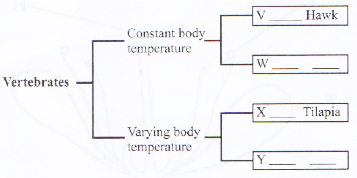
Which of the following pairs of animals correctly represents the groups labelled W and Y
W Y A Shark crocodile B Newt gecko C Chicken toad D Whale salamander - Which one of the following is common in fish, reptiles and amphibians?
- Presence of scales
- Presence of gills
- Varying body temperature
- External fertilisation
- The diagram below represents part of a certain bird
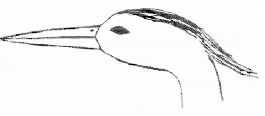
The bird most likely feeds on- fish
- nectar
- insects
- seeds
- The diagram below represents an improvised liqid thermometer
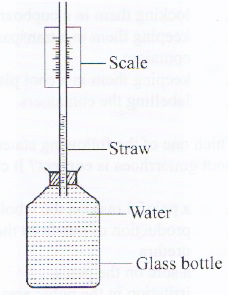
Which one of the following imporvements would make the instrument measure changes in temperature?- A narrower straw
- coloured water
- a plastic bottle
- a large bottle
- A person was wearing a light shirt and open shoes. The weather conditions were likely to be
- cold and windy
- hot and windy
- cold and wet
- hot and dry.
- Which one of the following pairs of sources of water will only provide hard water?
- Rain and well.
- Spring and boiler
- Well and spring
- Rain and river
- The following are activities that can help to conserve soil except
- ploughing down the hill
- mulching with dry grass
- planting sweet potato vines
- dumping vegetable waste in the gardens.
- Which one of the following would a farmer use to store large volumes of water?
- Drum.
- Tank.
- Pot.
- Dam
- Which of the following consists only of a pair that can make pond water safe for drinking?
- Addition of chemicals and filtration
- Decantation and boiling.
- Boiling and addition of chemicals.
- Filtration and decantation.
- Discolouring of white garments during washing can be minimised by using
- soapy borehole water
- warm rain water
- soapy spring water
- warm borehole water.
- Which one of the following practices to help to prevent the spread of cholera?
- Keeping cooked food covered.
- Wearing gumboots when working in a swamp.
- Washing hands after eating.
- Eating roasted maize by the roadside.
- Deep trenches were observed on a farm on a hillside. The deep trenches weremost likely due to
- splash erosion
- gulley erosion
- rill erosion
- sheet erosion.
- The soil in which water rises least also
- makes long ribbons
- is rich in minerals
- has large particles
- has smooth texture.
- Which one of the following statements is correct about farmyard manure? They
- are made from plant and animal waste
- contain one micronutrient
- pollute the soil when in excess
- do not add organic matter to the soil.
- Which one of the following groups consist only of food that are used in body building and repair?
- Rice, oranges, beef.
- Wheat, fish, maize.
- Eggs, beans, milk.
- Beans, potatoes, groundnuts.
- Which one of the following statements correctly describe smoking of meat? The meat is
- dried using hot air over open fire
- placed on a layer of salt
- spread over hot charcoal
- placed on a hot pan.
- The main reason why a lactating mother needs a balanced diet and plenty of fluids is for
- formation of strong bones in the baby
- protection of the baby against diseases
- increasing the production of milk
- replacement of blood lost during birth
- Which one of the following materials can allow a person to see through?
- Clear water.
- Mirror.
- Frosted glass.
- Milk.
- Pieces of paper placed over a fire move upwards because because
- they are light
- hot air rises
- of radiation
- of heat.
- In which one of the following pair of processes is heat absorbed from the surroundings?
- Condensation and evaporation.
- Freezing and condensation.
- Melting and freezing.
- Evaporation and melting.
- In an investigation liquid X was found to be denser than liquid Y but less dense than liquid Z. The three liquids are immiscible.
The diagram that represents the correct observation when the three liquids are put in the same container is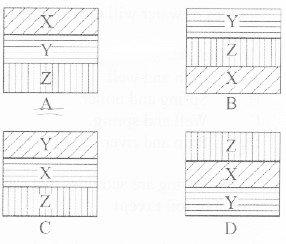
- A bowl made of iron may float when placed on water because of the
- mass
- shape
- size
- material
- The diagram below represents a demonstration of a certain property of light.

The diagram shows that light- travels in a straight line
- bounces back
- can be split
- apparently bends.
- In which one of the following pairs of activities is light used?
- Drying grains; making plant food
- Making plant food; using a solar cooker
- Using a solar cooker; drying grains
- Keeping pests away; drying grains
- The diagram below represents a simple electrical circuit with a gap at X.
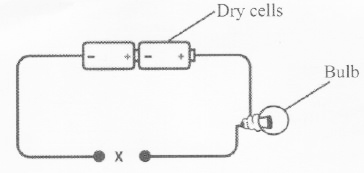
Which one of the following materials when used to close the gap would make the bulb to light?- Biro pen casing.
- Steel nail.
- Glass rod.
- Wooden rod.
- Which one of the following statements describe energy?
- Ability to do work.
- Moving objects from one point to another.
- Pushing or pulling an object.
- A force acting on an area.
- Which one of the following materials 84 can be separated using a magnet?
- Piece of steel wool and flour.
- Cement and wood ash.8
- Iron nails and steel pins.
- Salt and sugar.
- When a school bell is rung, everybody in the school hears the sound. This is because sound
- travels in air
- produced is special
- is reflected by obstacles
- travels in all directions.
- The diagram below illustrates working of a certain type of pulley.
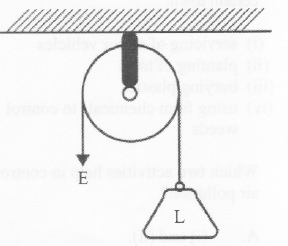
The diagram shows that effort- moves a longer distance than the load
- required is half that of the load
- moves in an opposite direction to that of the load
- and the load are not equal.
- Which one of the following is not a method of maintaining simple tools?
- Proper storage.
- Sharpening.
- Cleaning before use.
- Proper use.
- Which one of the following activities reduces friction?
- Re-treading tyres of motor vehicles.
- Streamlining shapes of objects.
- Drying moving parts of machines.
- Making a surface rough.
- The following are activities observed in a certain town.
- servicing of motor vehicles
- planting of trees
- burying plastics
- using farm chemicals to control weeds
Which two activities help in controlling air pollution?- (i) and (ii).
- (ii) and (iii).
- (iii) and (iv).
- (i) and (iv).
Marking Scheme
|
|
|
|
|
Kiswahili Questions And Answers - KCPE 2022 Past Papers
Maswali
Soma vifungu vifuatavyo. Vina nafasi 1 mpaka 15. Kwa kila nafasi umepewa majibu manne. Chagua jibu lifaalo zaidi kati ya yale uliyopewa.
Ijumaa 1 tulimtembelea Fauzia. Tulipofika kwake 2 kwa mikono miwili. 3 sebuleni ambapo tuliipata familia yake pamoja wakitazama kipindi fulani 4 runinga. Tuliandaliwa 5 wali, nyama, mboga na matunda. 6 mwenyeji kupiga dua, tulianza kula. Tulipomaliza chakula 7 tulishauriana na mwenyeji wetu na 8 kuhusu mradi wetu wa maji 9 utakinufaisha kijiji chetu. Kisha tukamuaga alamsiki naye akatujibu 10 .
| 1 | A. ilikopita | B. iliyopita | C. ilimopita | D. iliopita |
| 2 | A. tunakaribishwa | B tutakaribishwa | C. tulikaribishwa | D. tumekaribishwa |
| 3 | A.Tulielekezana | B. Tulielekezewa | C. Tulielekeza | D. Tulielekezwa |
| 4 | A. kwenye | B. penye | C. ndani ya | D. kati ya |
| 5 | ! | , | - | : |
| 6 | A. Japo | B. Licha ya | C.Baada ya | D. Sembuse |
| 7 | A. yote | B. wote | C. zote | D. chote |
| 8 | A. kukata kauli | B. kukata kiu | C. kukata notisi | D. kukata mate |
| 9 | A. ambaye | B. ambao | C. ambalo | D. ambayo |
| 10 | A. Sabalkheri! | B. buriani! | C. binuru! | D. Masalkheri! |
Tunapaswa kuwa na moyo wakusaidiana 11 ilivyokuwa zamani. 12 mmoja wetu 13 msaada kwa ajili ya jambo fulani, inafaa tumsaidie bila 14 . Tukifanya hivyo, tutakuwa pia tunajiwekea akiba maishani kwani 15 .
| 11 | A. angaa | B. ilimradi | C. hata | D. kama |
| 12 | A. Ingawa | B. Ikawa | C. Iwapo | D. Ijapokuwa |
| 13 | A. anahitajiwa | B. anahitaji | C. anahitajika | D. anahitajia |
| 14 | A. kinyongo | B. haraka | C. huzuni | D. kisasi |
| 15 | A. wema huzaa wema. | B.akili ni mali. | C. mkono mtupu haulambwi. | D. subira huvita heri. |
Kutoka nambari 16 mpaka 30, chagua jibu sahihi.
- Neno, 'tulimpokea' lina silabi ngapi
- 4
- 5
- 6
- 10
- Chagua wingi wa sentensi ifuatayo:
Mti ule wa mchungwa ulizaa tunda tamu.- Mti ule wa mchungwa ulizaa matunda matamu.
- Miti ile ya michungwa ilizaa tunda tamu.
- Miti ile ya michungwa ilizaa matunda matamu.
- Mti ule wa mchungwa ulizaa matunda tamu.
- Chagua jibu sahihi:
'Wachezaji wa soka huhimizana kufanya mazoezi kila siku'. 'na' imetumika kuonyesha:- Kufupishwa kwa viwakilishi nafsi.
- Hali ya kukubaliana katika jambo.
- Wakati usiodhihirika kwenye kitendo.
- Mnyambuliko wa kauli ya kutendana.
- Ni sentensi ipi ambayo inaunganisha sentensi zifuatazo ipasavyo.
Tamira alipika wali. Wali ulikuwa kwa Riziki.- Wali ulipikwa kwa Riziki na Tamira.
- Tamira alipikiwa wali kwa Riziki.
- Riziki alipikiwa wali kwa Tamara
- Wali ulipikwa kwa Tamira na Riziki.
- Ni jibu lipi lenye methali zenye maana sawa?
- Chanda chema huvikwa pete.
- Chumia juani ulie kivulini.
- Mcheza kwao hutuzwa.
- Mfuata nyuki hakosi asali.
- (i) (iv)
- (ii) (iv)
- (i) (iii)
- (ii) (iii)
- Chagua jibu lisilo ambatanishwa ipasavyo.
- - zito kama ndovu
- mbio kama duma
- - eusi kama mpingo
- chungu kama shubiri
- Ni kundi lipi la nomino ambalo lipo katika ngeli ya YA-YA
- maisha, maagizo
- marashi, maarifa
- maji, maembe
- maskani, mavazi
- Rudi ni kurejea ulipokuwa umetoka. Rudi pia ni:
- jambo kufanyika mara nyingine.
- nguo kuwa fupi baada ya kufuliwa.
- msamaha unaotolewa baada kukubali makosa.
- kitendo cha kubingiria kutoka mlimani.
- Chagua sentensi iliyoakifishwa vizuri:
- Hoyee, Mtoto amecheka kweli?
- Je? Unamfahamu karani huyu.
- Farida alinunua vifaa vifuatavyo: kitabu, kalamu na kifutio.
- Wachezaji walishangilia! baada ya ushindi huo jana jioni.
- Jesca anaishi kilomita moja kaskazini mashariki mwa shule yetu. Kibibi naye anaishi kilomita moja kusini mwa shule hiyo. Je, Kibibi anaishi upande gani wa Jesca?
- Kaskazini mashariki
- Kaskazini magharibi
- Kusini mashariki
- Kusini magharibi
- Kauli, 'Lugogo ni samaki majini', imetumia tamathali gani ya usemi?
- nahau
- sitiari
- tashihisi
- kinaya
- Chagua jibu lenye nomino ya makundi isiyofaa.
- Mzengwe wa nyuki.
- Thurea ya nyota.
- Kishazi cha samaki.
- Shungi la nywele.
- Onyesha sentensi yenye kivumishi.
- Mwajuma alisafisha darasa jana.
- Gari limefika mapema.
- Kule kuna miti mirefu.
- Wawili walisajiliwa chuoni.
- Ni jibu lipi lenye mapambo ya puani pekee?
- Jebu, kipuli
- Usinga, udodi
- Furungu, njuga
- Kipini, kikero
- 5/6 kwa maneno ni
- sudusi sita
- humusi sita
- sudusi tano
- humusi tano
Soma kifungu kifuatacho kisha ujibu maswali 31 mpaka 40.
Mawasiliano ni njia ya kupashana habari kutoka kwa mtu mmoja hadi mwingine. Sijui kama umewahi kuwazia namna watu wa kale walivyotekeleza mchakato huu wa mawasiliano. Kwangu ninaona njia za mawasiliano zilikuwa za ajabu mno. Hebu fikiria kufuka kwa moshi kama ishara ya ujumbe fulani. Je, unafahamu pia milio mbalimbali ilipitisha habari muhimu katika jamii hizo? Kumbuka mbiu ya mgambo wanasema ikilia kuna jambo. Hakika suala la mawasiliano ni nguzo muhimu katika maisha ya binadamu.
Ulimwengu wa sasa umepiga hatua kubwa sana kimaendeleo. Maendeleo hayo yameleta mabadiliko makuu katika mawasiliano. Mfumo wa mawasiliano umewaunganisha waja katika shughuli zao za kila siku. Ilikufanikisha a mawasiliano baina yao, jambo la kimsingi huwa ni kupitisha ujumbe. Wewe mwanafunzi, unapokuwa shuleni kunazo habari muhimu unazohitajika kumfikishia mzazi au mlezi wako. Je, unazifikisha vipi habari hizo?
Fikiria kuhusu wale wanaofanya kazi mbali na familia zao. Unadhani wanawafikishia wapendwa wao taarifa kwa njia gani? Kuna njia nyingi za kuwasilisha ujumbe. Kwa mfano kupiga simu. Vyombo vya habari navyo vinatuwezesha kupitisha ujumbe. Kila siku vinatupasha habari za kila aina. Ni vyema tufahamu kuwa ili mawasiliano yakamilike, basi ujumbe sharti umfikie mlengwa. Mlengwa naye anafaa kuufahamu ujumbe uliokusudiwa.
Tunapopokea ujumbe, tutafakari kuhusu yule aliyetuma ujumbe na ujumbe wenyewe. Sababu kuu ni kubaini lengo kuu la mawasiliano yake. Je, amekusudia nini? Wengi wanaopokea ujumbe wanashindwa kumwelewa aliyetuma ujumbe kutokana na hali ya ujumbe wake. Lugha aliyoitumia inaweza kuwa na utata ambao unatinga kueleweka kwa ujumbe huo. Wengine wanatumia lugha ya mafumbo ambayo labda haieleweki na mlengwa wa ujumbe. Wazia kuwa umemwomba rafiki yako akununulie mbuzi kwa kuwa unahitaji kumfuga nyumbani, kisha ujumbe huu umpige chenga akuletee
kifaa cha kukunia nazi.
Je, utamlaumu au utamcheka mpaka mbavu zivunjike? Iwapo tunahitaji kufanikisha mawasiliano, basi ni muhimu tutumie lugha inayoeleweka vyema. Tukumbuke kuwa, katika lugha, maneno huwa na maana mbalimbali katika muktadha.
Hali ya mpokezi wa ujumbe inaweza kuwa kikwazo cha mawasiliano. Huenda anayepokea ujumbe amekumbwa na hali ambazo zinamkosesha utulivu wa kimawazo. Hali hizo zinaweza kuwa matatizo ya kiafya, majukumu ya malezi na kazi miongoni mwa mengine. Hali hii inaweza kutatiza mkondo wake wa mawazo akakosa makini ya kuufahamu ujumbe uliokusudiwa. Mazingira aliyomo mpokezi wa ujumbe huo, huenda pia yakaathiri uelewa wa ujumbe. Chukulia kwa mfano, umetumwa gulioni kununua bidhaa. Kama ilivyo kawaida, maeneo kama hayo huwa na halaiki ya watu na kelele nyingi. Si muziki, si matangazo ya kibiashara, si mahubiri, yataje yote. Ukipigiwa simu wakati kama huo unaweza kukosa kuisikia. Iwapo utaisikia upokee, mawasiliano yatatizika bila shaka.
Kufanikiwa kwa shughuli nzima ya mawasiliano kunategemea iwapo aliyetuma ujumbe amepokea majibu kwa mujibu wa ujumbe wake. Ni vyema basi tutafakari kuhusu vikwazo vyote ambavyo vinatatiza mawasiliano. Tukumbuke kuwa mawasiliano yetu hutegemea mahusiano yetu, viwango vyetu vya elimu, mila na desturi na chombo cha mawasiliano kinachotumika miongoni mwa mengine. Kila kipengele kitiliwe maanani kwa kuwa ufanisi wa mawasiliano utategemea uelewa wa ujumbe.
- Chagua jibu sahihi kwa mujibu wa aya ya kwanza:
- Mwandishi anawahurumia watu wa enzí ya zamani.
- Maisha bora ya jamii hutegemea namna tunavyowasiliana na watu wengine.
- Utaratibu wa sasa wa kupitisha habari ni bora kuliko wa zamani.
- Upashanaji wa habari wa kale uliwashangaza wengi.
- Kulingana na aya ya pili:
- Mahitaji mbalimbali ya wanajamii yamezua mbinu nyingi za kupashana habari.
- Taarifa kutoka shuleni zinachangia uelewa wa mambo ya nyumbani.
- Upashanaji wa habari katika jamii hutegemea wanahabari wenyewe.
- Ustawi wa jamii unategemea vifaa vya Akiteknolojia pekee.
- Kulingana na kifungu:
- Wahenga waliulizana maswali mengi kuhusu upashanaji wa habari.
- Matarajio ya mpokezi wa ujumbe My huathiri ufahamu wa taarifa.
- Upataji wa habari kwa wepesi hutegemea ufahamu wa ujumbe.
- Lugha tofauti anazozijua mpokezi way ujumbe humwezesha kupokea habari.
- Ni kauli ipi si sahihi kulingana na aya ya tatu?
- Msingi wa upashanaji habari ni kufahamu madhumuni ya anayetuma taarifa.
- Kutumia lugha fiche katika ujumbe huharibu uhusiano wa kijamii.
- Kiwango cha lugha katika ujumbe huweza kutatiza uelewa wa habari.
- Kutoelewa ujumbe kuna madhara kwa anayetuma na kupokea habari.
- Kifungu kimebainisha kwamba:
Mawasiliano- yanafaidi wenye simu.
- yanaleta familia pamoja.
- hufaulu mahali penye utulivu.
- humfanya mtu afikirie sana.
- Aya ya nne imebainisha kwamba:
- Utaratibu wa kupashana habari hutegemea namna mtu anavyofikiria kuhusu maisha.
- Kazi anazofanya mtu hutatiza jinsi anavyopokea ujumbe.
- Mahali alipo anayetuma ujumbe huweza kuathiri uelewa wa taarifa lengwa.
- Upokeaji ujumbe kwa usahihi hutegemea umakinifu wa mpokezi.
- Kwa mujibu wa kifungu, lugha ya mawasiliano inafaa
- iwe wazi na rahisi kwa mpokezi.
- iwe ya kumvutia mpokezi na yenye mafumbo.
- kuleta maana mbalimbali kwa mpokezi.
- kutuliza fikira za mpokezi wa ujumbe.
- Maoni ya mwandishi katika aya ya mwisho ni kwamba:
- Ukamilifu wa mawasiliano huamuliwa na muda anaochukua mpokezi kutoa jawabu.
- Mawasiliano baina ya binadamu katika jamii huathiriwa na utamaduni wao.
- Ujumbe unaopitishwa kwa vifaa vya mawasiliano pekee ni bora zaidi.
- Vizuizi vya mawasiliano hutokea pale tunapowaza kuhusu hali ya mpokezi.
- Kauli 'umpige chenga' imetumia tamathali gani ya usemi?
- sitiari
- tashbihi
- nahau
- tashihisi
- Maana ya, 'halaiki ya watu' kulingana na kifungu ni:
- Watu wenye mienendo inayofanana.
- Watu wengi waliokusanyika pamoja.
- Wataalamu wenye maarifa mengi.
- Wauzaji wa bidhaa sokoni.
Soma kifungu kifuatacho kisha ujibu maswali 41 mpaka 50.
Sound
Mimi na Mwamba tulijiunga na shule ya msingi ya Maarifa wakati mmoja. Tangu wakati huo nimemtambua Mwamba kama rafiki wa kuaminika. Tulisoma pamoja, tukacheza pamoja na kushirikiana katika mambo mengi. Alikuwa mmakinifu, msikivu na mchangamfu. Unadhifu wake uliwavutia wengi. Hata mimi aliniathiri nikamuiga. Walimu na wanafunzi walimshabikia na kumthamini hata wakamchagua kuwa kiongozi. Vipawa vya Mwamba vilianza kuchipuka mapema.Naye Mwamba alijitahidi kuvipalilia.
Bidii ya Mwamba inaweza kumithilishwa na ile ya mchwa kujenga kichuguu kwa mate. Mwamba alifahamu fika kuwa mja yeyote kujaliwa ni yeye mwenyewe kujipa uvumilivu, kutia bidii na kushirikiana na wenzake. Alifanya juu chini kuelewa yote tuliyofundishwa na walimu wetu. Ingawa akili yake ilikuwa kama sumaku, pale ambapo alitatizika kuelewa hakufa moyo. Alikuwa tayari wakati wote kujadiliana na wenzake katika vikundi. Alitambua kuwa jifya moja haliinjiki chungu. Pamoja na hayo, Mwamba alijaliwa moyo wa kusaidia. Wakati mwingine katika kundi letu alitufafanulia mada ambazo hatukuzielewa vizuri. Aliwafaa hata wale waliokuwa na changamoto ya kuelewa yaliyofunzwa na walimu. Ama kwa hakika, tulishangazwa na subira na unyenyekevu wake.
Mimi na rafiki yangu Mwamba tulijiunga na timu ya soka ya shule yetu. Alichukua nafasi ya mshambulizi nami nikawa mlinda lango. Kila tuliposhiriki kwenye mashindano, Mwamba aliifungia timu yetu mabao mengi. Mara nyingi, tuliibuka washindi na kuwaacha wapinzani wetu vinywa wazi. Nyota ya Mwamba ilianza kung'aa michezoni. Alipokea tuzo ya mwanasoka bora zaidi katika gatuzi letu. Nayo timu yetu ilinyakua kombe la ushindi na sare kamili za kandanda. Shule yetu ilisifika na kutambulika kama kitovu cha wachezaji kandanda chipukizi. Hata baadhi yetu tulichaguliwa kujiunga na timu ya kitaifa ya vijana.
Mwaka huu, Mwamba amegundua kipawa chake kingine katika rubaa ya muziki baada ya kujiunga na bendi ya muziki shuleni. Wakati wa gwaride na pia sherehe mbalimbali shuleni ameweza kupata nafasi ya kututumbuiza. Sauti yake ya kinanda na nyimbo zake zimevuma kotekote. Kuvuma kwa nyimbo hizo kunatokana na ujumbe wa nyimbo zake. Nyimbo hizo huwahimiza watu kukuza maadili na bidii kila uchao. Hakika, zinatuliza mioyo, zinahimiza, zinachochea watu kuwa na upendo, amani na ushirikiano. Katika siku za hivi majuzi bendi yao imetunga nyimbo ambazo zimevutia wafuasi wengi mitandaoni. Baadhi ya vituo vya mawasiliano vimetuma maombi kualika bendi hiyo kwenye studio zao. Azma yao ni kurekodi baadhi ya nyimbo zao ili zitumike kama milio kwenye simu zinapopigwa au kukiriza. Aidha nyimbo zao huchezwa kwenye vituo mbalimbali vya redio na runinga. Chini ya uongozi wa mwalimu wao, ambaye ni mlezi wa bendi yao, wameweza kujipatia hela ambazo zimetumika kununulia vyombo zaidi vya muziki. Mwalimu huyu wao huhakikisha kuwa bendi hiyo ina nidhamu ya hali ya juu.
Juma lililopita, mwalimu wa zamu aliwapa nafasi wanafunzi kadha kutoa nasaha kuhusu namna ya kufanikiwa masomoni. Mwamba alikuwa miongoni mwao. Hotuba yake ililenga ndipo. Alisema, "Wanafunzi wenzangu, kufaulu kwetu masomoni na pia maishani hakutegemei kule tulikotoka bali nidhamu ya mtu mwenyewe". Alituambia kuwa achanikaye kwenye mpini hafi njaa. Kwa hivyo, tujitahidi masomoni. Aliongezea kusema kuwa, kila mtu amejaliwa muda wa saa ishirini na nne kila siku. Alituhimiza tuuratibu muda wetu vyema. Katika kuhitimisha hotuba yake alisisitiza tuwaheshimu wakubwa wetu ili tuweze kufanikiwa maishani. Hotuba yake hupigiwa debe shuleni hadi leo.
- Chagua jibu sahihi kulingana na aya ya kwanza:
- Sifa nzuri za mtu humfanya kutambulikana na wengi.
- Wanafunzi wote shuleni walifuata mienendo ya Mwamba.
- Viwango vya usafi shuleni viliimarishwa na Mwamba.
- Vipaji vya Mwamba vilikuzwa na wenzake wakiwa shuleni.
- Aya ya pili imebainisha kwamba:
- Mpango wa Mwamba wa kutoa mafunzo ya ziada uliwavutia wote shuleni.
- Kufanya jambo kwa pamoja shuleni kulileta mafanikio kwa Mwamba na wenzake.
- Mwamba alikuwa na uwezo wa kufahamu yote yaliyofunzwa shuleni kwa wepesi.
- Kustaajabia ujuzi wa Mwamba kuliwafanya wanafunzi wote wam- heshimu zaidi.
- Chagua jibu lisilo sahihi' kwa mujibu wa aya ya tatu:
Ushindi wa timu ya soka ya shule ya Maarifa- uliwapa wachezaji nafasi ya kukuza vipawa vyao.
- uliwawezesha wachezaji kutambuliwa katika kiwango cha gatuzi lao.
- ulifanya shule ya Maarifa kujulikana na wengi.
- ulitegemea ustadi wa soka aliokuwa nao Mwamba pekee.
- Kifungu kimebainisha kwamba:
- Matumaini ya mtu maishani huchangia kufanikiwa kwake.
- Uongozi hutegemea idadi ya talanta alizonazo mtu.
- Kutambua talanta moja mapema kunamwezesha mtu kuwasaidia wengine kuzua vipaji vyao.
- Kuvuma kwa shule ya Maarifa kulito- kana na nyimbo za bendi yake.
- Chagua jibu sahihi kwa mujibu wa aya ya nne:
- Kila mwaka, Mwamba na wenzake walishirikiana kutambua vipaji vyao.
- Vyombo vya habari viliongezea mapato yake kutokana na nyimbo za Mwamba.
- Walimu wana jukumu la kuweka msingi mzuri kukuza vipaji vya vijana.
- Kualikwa kwa wanabendi studioni kulitegemea vifaa vingi vya muziki walivyonunua.
- Mwamba ni mfano bora kwa wenzake kwa kuwa:
- Walifuata matendo yake mema.
- Walijiunga na bendi ya shule.
- Alialikwa kwenye vituo vya habari.
- Alihifadhi fedha alizopata kutokana na muziki.
- Lipi si jibu sahihi kulingana na aya ya mwisho.
Kufaulu masomoni kunategemea:- Matumizi ya muda wetu.
- Mazingira ambayo tumelelewa.
- Maamuzi tunayofanya kuhusu elimu yetu.
- Mawaidha tunayopata kutoka kwa wenzetu.
- Chagua mfuatano sahihi wa matukio yafuatayo kulingana na kifungu.
- Mwamba kupokea tuzo.
- Mwamba kujiunga na bendi ya muziki.
- Nyimbo za Mwamba kuvuma.
- Mwamba kujiunga na timu ya soka.
- Nyimbo za Mwamba kuchezwa kwenye vituo vya habari.
- (ii) (iii) (v) (iv) (i)
- (iv) (iii) (v) (ii) (i)
- (ii) (iv) (i) (iii) (v)
- (iv) (i) (ii) (iii) (v)
- . Kauli, 'akili yake ilikuwa kama sumaku' imetumia tamathali gani ya usemi?
- sitiari
- tashbihi
- nahau
- chuku
- Hotuba ya Mwamba hupigiwa debe shuleni mwetu hadi leo ina maana kuwa:
- Inasisitizwa kila wakati.
- Inashangiliwa mara nyingi.
- Inafurahiwa na wote shuleni.
- Inafundishwa katika kila darasa.
Majibu
|
|
|
|
|
English Questions And Answers - KCPE 2022 Past Papers
Questions
Questions 1 to 15
Read the passage below. It contains blank spaces numbered 1 to 15. For each blank space, choose the best alternative from the coices given.
For me the actual writing of a composition seems fairly easy. I sit down 1 my desk and write. It is the 2 up of the story that is 3 difficult. Most of my compositions are done early in the morning 4 . I find myself fresh. the process of writing 5 compositions is clear. After I have drafted the composition says exactly what I 6 to put across. I used to 7 this important step, but I have slowly come to realise that it may be 8 most important part of writing. Besides, correcting 9 . I cross out unnecessary words, and I 10 find myself adding o0ther words. Depending on the 11 of my composiiton, I may do this three or four times. I guess that I only spend about 30 percent of any 12 time actually writing the composition. another 40 percent or 13 is used in thinking and coming up with a story, with the 14 used in doing revision. I don't think I will ever be able to just sit down and wstart writing without 15 planning.
(Adapted from English and Communication (6th ed.) by Stewart Zimmer Clark, Me graw Hill: USA, 1961)
| 1. | A. by | B. at | C. on | D. in |
| 2 | A. making | B. coming | C. thinking | D. bringing |
| 3 | A. never | B. rarely | C. also | D. rather |
| 4 | A. then | B. if | C. since | D. so |
| 5 | A. those | B. this | C. that | D. these |
| 6 | A. know | B. believe | C. intend | D. guess |
| 7 | A. ignore | B. like | C. consider | D. reject |
| 8 | A. the | B. this | C. a | D. that |
| 9 | A. handwriting | B. words | C. letters | D. mistakes |
| 10 | A. again | B. often | C. hardly | D. don't |
| 11 | A. size | B. length | C. number | D. beauty |
| 12 | A. given | B. free | C. extra | D. spare |
| 13 | A. that | B. much | C. so | D. such |
| 14 | A. others | B. equal | C. remainder | D. same |
| 15 | A. exact | B. fast | C. nice | D. proper |
For questions 16 and 17, choose the option which means the same as the underlined word.
- The robber surrendered after a long chase by the police.
- went in
- went down
- gave in
- gave out
- The girl disclosed her elder brother's plan to marry her off.
- announced
- showed
- concealed
- revealed
For questions 18 and 20 , choose the alternative that best fills the blank space
- Neither of my parents ________ at home now.
- is
- are
- was
- were
- She has been ______ in the field for the last twenty minutes.
- laying
- laid
- lying
- lain
- We are three girls in our family and Jane is the _______ .
- elder
- eldest
- older
- oldest
For each of questions 21 to 23, choose the best sentence that means the same as the underlined one.
- If it had not rained, we would have done enough practice
- We did enough practice because it had rained.
- It did not rain, so we did enough practice
- The rain did not stop us from doing enough practice.
- We did not do enough practice because it had rained.
- It hardly rains in the Sahara desert.
- It never rains in the Sahara desert.
- It often rains in the Sahara desert.
- It rarely rains in the Sahara desert.
- It heavily rains in the Sahara desert.
- “Mutai won the 1000 metres race in Tanzania," Kogo said.
- Kogo said that Mutai will win they 1000 metres race.
- Kogo said that Mutai had won the 1000 metres race in Tanzania.
- Kogo said that Mutai wins the 1000 metres race in Tanzania.
- Kogo said that Mutai would win the 1000 metres race.
For questions 24 and 25, choose the sentence ame which is correctly punctuated.
-
- Did you watch news yesterday? asked Tony.
- "Did you watch news yesterday?" Asked Tony.
- "Did you watch news yesterday?" asked Tony.
- Did you watch news yesterday? Asked Tony.
-
- As soon as it rains we will plant maize.
- As soon as, it rains we will plant maize.
- As soon, as it rains we will plant maize.
- As soon as it rains, we will plant maize.
Read the passage below and then answer questions 26 to 38.
I soon learned that life for a growing boy was not all play; at least not for boys with parents like mine. Although my mother had never had the benefit of formal education herself, she was determined that I should be sent to school at the earliest opportunity. My father, due to my mother's persuasive power, was strongly in favour of this also. Even though I could often get round my father, I knew that once my mother's mind had been made up, there was nothing I could do about it.
I found my first day at school so disappointing that I ran away, determined never to return. But my mother turned a deaf ear to my protests and firmly dragged me by the arm every morning and deposited me in the school. Eventually, I realised that I had lost the battle. I decided that since I was going to
forced to stay in school, I might as well get to like it and do what I could to learn something. To my surprise, I soon found that I enjoyed my lessons and looked forward to going to school. However, we lived in fear of the teacher because of his firm belief in the old adage: 'Spare the rod and spoil the child'. I disliked being forced to do things against my will because I was not used to it. I used to think what a paradise school would be if we were left in peace to do our studies without the presence of a master.
All the various grades occupied one room, and the teacher used to teach a class at a time. It must have been a hard job for him, and we did not do much to make it easy for him. Luckily, I was keen on learning. In fact, I was so keen that my only dread was that my father might one day be unable to afford the school fees which at that time amounted to ten shillings a term. Because of this, I began rearing chickens which I sold for fifty cents each. By this means, I could not only help to meet my school fees, but I had money to buy books as well.
One thing in particular stands out in my mind during my early school days, probably because it was my first lesson in discipline. We were not fond of the teacher because of his frequent use of the bark stick, often without a good reason. One day we learnt that an inspector was coming to the school and immediately saw our chance to get our revenge on the teacher. We got together and decided to stay away from school the whole day during the inspector's visit. My one regret was that I was not able to see the expression on the inspector's face when he found an empty classroom or, better still, the look of horror and amazement on the face of the teacher. It certainly must have caused him a lot of embarrassment but the following morning he got the last laugh. As soon as we showed our faces, he had his stick ready. We were each given twenty-four lashes on our bare bottoms. This hurt so much that for the next three days, I was unable to sit down at my desk. But I knew I deserved it. From that day, I have learnt to accept punishment that I feel I have justly earned.
(Adapted from Ghana by Kwame Nkurumah)
- Why did the writer's father support his going to school?
- He knew his son would be successful.
- The writer's mother convinced him.
- His love for education was great.
- He had to agree with the writer's mother.
- The writer says he was often able to 'get round' his father. This means that he could
- influence his father to do what he wanted.
- walk together with his father.
- ask his father difficult questions.
- make his father like him much more.
- 'But my mother turned a deaf ear....' This means that the writer's mother
- did not hear everything he said.
- did nothing to help him.
- did not listen to him.
- did not understand him at all.
- What battle is the writer referring to in the second paragraph?
- The harrassment by the teacher at school.
- The great disappointment suffered at school.
- The way his mother dragged him to school.
- The struggle to avoid going to school.
- Why was the writer surprised to find out that he soon enjoyed going to school?
- He had known that schooling was the hardest thing to do.
- He had not expected he would ever like going to school.
- He still believed that school was not for boys like him.
- He had not thought school would become a paradise.
- The writer's teacher believed that
- children need to be disciplined.
- children are naturally lazy.
- children should respect visitors.
- children require a lot of care.
- How many classrooms did the writer's s school have?
- Many
- Two
- One
- None
- The word 'dread' as used in the passage or means
- trouble.
- fear.
- idea.
- question.
- The writer started rearing chickens in order to
- help his father feed the family.
- have something to do after school.
- practise what he had learnt at school.
- take care of the cost of his education.
- The writer's mother can be described as
- harsh
- stubborn.
- persistent.
- generous.
- Why did the pupils decide to stay away from school?
- To avoid the teacher's punishment.
- To make the teacher feel ashamed.
- To shock the school inspector.
- To have a whole day to themselves.
- What lesson did the writer learn about discipline in school?
- That one should be in school when inspectors visit.
- That one should accept punishment if it is justly given.
- That one should avoid taking revenge when punished.
- That one should keep away from bad company.
- Which of the following would be the most suitable title for this passage?
- My early school years
- My day of punishment
- My day of revenge
- My love for school
Read the following passage and then asnwer questions 39 to 50
One day, Hare met Elephant on the way to the forest. As Hare is a cunning and clever animal, he wanted to fool Elephant. He started talking to Elephant," Elephant my brother, good morning. What is the matter? Why are you walking all alone like that, my friend? Why don't you ask me to walk along with you through the forest?"
After they had walked together for some time, Hare said "Elephant my brother, I want to go on a rope-pulling contest with you. I know that I can defeat you miserably, for I am stronger than you." Elephant replied, "You are too small to contest with me. You are playing about, my brother, think twice."
Questions
Questions 1 to 15
Read the passage below. It contains blank spaces numbered 1 to 15. For each blank space, choose the best alternative from the coices given.
For me the actual writing of a composition seems fairly easy. I sit down 1 my desk and write. It is the 2 up of the story that is 3 difficult. Most of my compositions are done early in the morning 4 . I find myself fresh. the process of writing 5 compositions is clear. After I have drafted the composition says exactly what I 6 to put across. I used to 7 this important step, but I have slowly come to realise that it may be 8 most important part of writing. Besides, correcting 9 . I cross out unnecessary words, and I 10 find myself adding o0ther words. Depending on the 11 of my composiiton, I may do this three or four times. I guess that I only spend about 30 percent of any 12 time actually writing the composition. another 40 percent or 13 is used in thinking and coming up with a story, with the 14 used in doing revision. I don't think I will ever be able to just sit down and wstart writing without 15 planning.
(Adapted from English and Communication (6th ed.) by Stewart Zimmer Clark, Me graw Hill: USA, 1961)
| 1. | A. by | B. at | C. on | D. in |
| 2 | A. making | B. coming | C. thinking | D. bringing |
| 3 | A. never | B. rarely | C. also | D. rather |
| 4 | A. then | B. if | C. since | D. so |
| 5 | A. those | B. this | C. that | D. these |
| 6 | A. know | B. believe | C. intend | D. guess |
| 7 | A. ignore | B. like | C. consider | D. reject |
| 8 | A. the | B. this | C. a | D. that |
| 9 | A. handwriting | B. words | C. letters | D. mistakes |
| 10 | A. again | B. often | C. hardly | D. don't |
| 11 | A. size | B. length | C. number | D. beauty |
| 12 | A. given | B. free | C. extra | D. spare |
| 13 | A. that | B. much | C. so | D. such |
| 14 | A. others | B. equal | C. remainder | D. same |
| 15 | A. exact | B. fast | C. nice | D. proper |
For questions 16 and 17, choose the option which means the same as the underlined word.
- The robber surrendered after a long chase by the police.
- went in
- went down
- gave in
- gave out
- The girl disclosed her elder brother's plan to marry her off.
- announced
- showed
- concealed
- revealed
For questions 18 and 20 , choose the alternative that best fills the blank space
- Neither of my parents ________ at home now.
- is
- are
- was
- were
- She has been ______ in the field for the last twenty minutes.
- laying
- laid
- lying
- lain
- We are three girls in our family and Jane is the _______ .
- elder
- eldest
- older
- oldest
For each of questions 21 to 23, choose the best sentence that means the same as the underlined one.
- If it had not rained, we would have done enough practice
- We did enough practice because it had rained.
- It did not rain, so we did enough practice
- The rain did not stop us from doing enough practice.
- We did not do enough practice because it had rained.
- It hardly rains in the Sahara desert.
- It never rains in the Sahara desert.
- It often rains in the Sahara desert.
- It rarely rains in the Sahara desert.
- It heavily rains in the Sahara desert.
- “Mutai won the 1000 metres race in Tanzania," Kogo said.
- Kogo said that Mutai will win they 1000 metres race.
- Kogo said that Mutai had won the 1000 metres race in Tanzania.
- Kogo said that Mutai wins the 1000 metres race in Tanzania.
- Kogo said that Mutai would win the 1000 metres race.
For questions 24 and 25, choose the sentence ame which is correctly punctuated.
-
- Did you watch news yesterday? asked Tony.
- "Did you watch news yesterday?" Asked Tony.
- "Did you watch news yesterday?" asked Tony.
- Did you watch news yesterday? Asked Tony.
-
- As soon as it rains we will plant maize.
- As soon as, it rains we will plant maize.
- As soon, as it rains we will plant maize.
- As soon as it rains, we will plant maize.
Read the passage below and then answer questions 26 to 38.
I soon learned that life for a growing boy was not all play; at least not for boys with parents like mine. Although my mother had never had the benefit of formal education herself, she was determined that I should be sent to school at the earliest opportunity. My father, due to my mother's persuasive power, was strongly in favour of this also. Even though I could often get round my father, I knew that once my mother's mind had been made up, there was nothing I could do about it.
I found my first day at school so disappointing that I ran away, determined never to return. But my mother turned a deaf ear to my protests and firmly dragged me by the arm every morning and deposited me in the school. Eventually, I realised that I had lost the battle. I decided that since I was going to
forced to stay in school, I might as well get to like it and do what I could to learn something. To my surprise, I soon found that I enjoyed my lessons and looked forward to going to school. However, we lived in fear of the teacher because of his firm belief in the old adage: 'Spare the rod and spoil the child'. I disliked being forced to do things against my will because I was not used to it. I used to think what a paradise school would be if we were left in peace to do our studies without the presence of a master.
All the various grades occupied one room, and the teacher used to teach a class at a time. It must have been a hard job for him, and we did not do much to make it easy for him. Luckily, I was keen on learning. In fact, I was so keen that my only dread was that my father might one day be unable to afford the school fees which at that time amounted to ten shillings a term. Because of this, I began rearing chickens which I sold for fifty cents each. By this means, I could not only help to meet my school fees, but I had money to buy books as well.
One thing in particular stands out in my mind during my early school days, probably because it was my first lesson in discipline. We were not fond of the teacher because of his frequent use of the bark stick, often without a good reason. One day we learnt that an inspector was coming to the school and immediately saw our chance to get our revenge on the teacher. We got together and decided to stay away from school the whole day during the inspector's visit. My one regret was that I was not able to see the expression on the inspector's face when he found an empty classroom or, better still, the look of horror and amazement on the face of the teacher. It certainly must have caused him a lot of embarrassment but the following morning he got the last laugh. As soon as we showed our faces, he had his stick ready. We were each given twenty-four lashes on our bare bottoms. This hurt so much that for the next three days, I was unable to sit down at my desk. But I knew I deserved it. From that day, I have learnt to accept punishment that I feel I have justly earned.
(Adapted from Ghana by Kwame Nkurumah)
- Why did the writer's father support his going to school?
- He knew his son would be successful.
- The writer's mother convinced him.
- His love for education was great.
- He had to agree with the writer's mother.
- The writer says he was often able to 'get round' his father. This means that he could
- influence his father to do what he wanted.
- walk together with his father.
- ask his father difficult questions.
- make his father like him much more.
- 'But my mother turned a deaf ear....' This means that the writer's mother
- did not hear everything he said.
- did nothing to help him.
- did not listen to him.
- did not understand him at all.
- What battle is the writer referring to in the second paragraph?
- The harrassment by the teacher at school.
- The great disappointment suffered at school.
- The way his mother dragged him to school.
- The struggle to avoid going to school.
- Why was the writer surprised to find out that he soon enjoyed going to school?
- He had known that schooling was the hardest thing to do.
- He had not expected he would ever like going to school.
- He still believed that school was not for boys like him.
- He had not thought school would become a paradise.
- The writer's teacher believed that
- children need to be disciplined.
- children are naturally lazy.
- children should respect visitors.
- children require a lot of care.
- How many classrooms did the writer's s school have?
- Many
- Two
- One
- None
- The word 'dread' as used in the passage or means
- trouble.
- fear.
- idea.
- question.
- The writer started rearing chickens in order to
- help his father feed the family.
- have something to do after school.
- practise what he had learnt at school.
- take care of the cost of his education.
- The writer's mother can be described as
- harsh
- stubborn.
- persistent.
- generous.
- Why did the pupils decide to stay away from school?
- To avoid the teacher's punishment.
- To make the teacher feel ashamed.
- To shock the school inspector.
- To have a whole day to themselves.
- What lesson did the writer learn about discipline in school?
- That one should be in school when inspectors visit.
- That one should accept punishment if it is justly given.
- That one should avoid taking revenge when punished.
- That one should keep away from bad company.
- Which of the following would be the most suitable title for this passage?
- My early school years
- My day of punishment
- My day of revenge
- My love for school
Read the following passage and then asnwer questions 39 to 50
One day, Hare met Elephant on the way to the forest. As Hare is a cunning and clever animal, he wanted to fool Elephant. He started talking to Elephant," Elephant my brother, good morning. What is the matter? Why are you walking all alone like that, my friend? Why don't you ask me to walk along with you through the forest?"
After they had walked "Elephant my brother, I want to go on a rope-pulling contest with you. I know that I can defeat you miserably, for I am stringer than you', Elephant replied, "You are too small to contest with me. You are playing about, my brother, think twice."
They then planned to go on a contest the next day in the forest. Elephant went away laughing, thinking that Hare could do nothing to him.
The same day, Hare met Hippo and started talking to him saying, "Hippo my brother, I want you to contest with me one of these fine days. We shall pull a rope across the forest and see who the winner will be." Hippo said, ' Don't play with me, brother. You are just too tiny to contest with me." He made the same plan, just as he had done with Elephant.
The next morning, Hippo and Elephant went to the opposite sides of the forest thinking that he was going to contest Hare. They started pulling the rope. Meanwhile, Hare was sitting on a high hill looking at what was happpening below. he sang a song to taunt Elephant and Hippo. As he sang, Hippo and elephant6 pulled harder. They pulled and pulled and got very weary. At dusk, they almost fainted and stopped pulling.
Hare immediately went ot the elephant and asked, "Am I not great?"
Elephant replied, "Oh, Hare, mr brother, I agree that you are really great. I've has it tough the whole day."
Hare then ran to Hippo and told him the same thing he had told Elephant. Hippo wondered at the strength of Hare and said, "Hare my brother, I've just realised that you are very strong. In fact, you should be made King of the jungle!" Hare went away merrily playing his flute.
- The word "cunning" as used in the first paragraph can best be replaced by
- tricky.
- brave
- honest.
- proud.
- Hare asked Elephant questions in order to
- praise Elephant.
- test Elephant's courage.
- attract Elephant's attention.
- tease Elephant
- The word "defeat" as used in the story has the same meaning as
- win.
- beat.
- pull.
- hit.
- Which one of the following can best replace "think twice" as used in the story?
- Think carefully
- Think aloud.
- Think big.
- Think two times.
- What brought the contest between Elephant and Hippo to an end?
- Darkness set in.
- Hare stopped it.
- They became tired.
- They lost breath.
- Why was Hare singing during the contest?
- To make Elephant and Hippo strong.
- To entertain Elephant and Hippo.
- To mock Elephant and Hippo.
- To cheer on Elephant and Hippo.
- "I have had it tough the whole day" means
- Elephant felt angry.
- Elephant got ashamed.
- Elephant had struggled.
- Elephant was strong.
- Why did Hare organise the contest between Elephant and Hippo?
- To test if Elephant and Hippo were obedient to him.
- To make them believe that he was the strongest.
- To find out who was stronger between Elephant and Hippox
- To be declared the king of the jungle by Hippo.
- Which of the following words best describes Elephant and Hippo?
- Foolish.
- Patient.
- Grateful.
- Stubborn.
- Which one of the following statements is true according to the passage?
- We should not trust friends too much.
- We should not compete with our friends.
- We should not take part in contests.
- We should not sing as we work.
- What do you think was in the minds of Elephant and Hippo as they started pulling the rope?
- They would have a tough contest.
- The competition would be easy.
- They feared losing the contest.
- The winner would be Hare.
- What lesson do we learn from the story?
- Small animals are cunning.
- Wisdom is strength.
- Determination is success.
- Big animals are weak
Marking Scheme
|
|
|
|
|
Mathematics Questions And Answers - KCPE 2022 Past Papers
Questions
- What is 400300085 written in words?
- Four hundred million three hundred and eighty five.
- Four hundreed million three thousand and eighty five.
- Four hundred million thirty thousand and eighty five.
- Four hundred million three hundred thousand and eighty five.
- Whta is the total value of digit 6 in 5960124?
- 600
- 6 000
- 60 000
- 600 000
- Which one of the following statements is correct?
- 0.95 < 0.095
- 0.075 > 0.75
- 3.85 < 3.75
- 1.25 > 0.125
- What is the value of
8² - 8 + 3?
4- 5
- 14
- 17
- 65
- A tailor had 24 3/4 metres of a clothing material. The tailor sold 1/3 of the material and used 1 1/4 metres to make a shirt. How many metres of the clothing material remained?
- 16 1/2
- 15 1/4
- 9 1/2
- 7
- Work out 1/3 of (1/4 + 3/5) ÷ 1/4
- 16/27
- 17/240
- 1 2/15
- 2 29/60
- What is the next number in the pattern 45, 51, 57, 59, 65, 71, _________?
- . 73
- 75
- 77
- 79
- Karanja, Wanjala and Amina weighed themselves. Karanja weighed 46.8 kg. Wanjala was 0.5 kg heavier than Karanja while Amina was 1.3 kg lighter than Wanjala. What was their total mass altogether?
- 142.7kg
- 140.1kg
- 139.6kg
- 138.1kg
- What is the value of
4.8 x 18.3
6 x 0.6- 244
- 24.4
- 2.44
- 0.244
- What is 962.997 rounded off to 1 decimal place?
- 962.0
- 962.9
- 963.0
- 963
317038
- In the figure shown, what is the area of the shaded part?
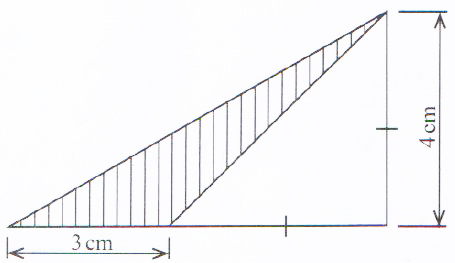
- 6 cm2
- 8 cm2
- 14 cm2
- 20 cm2
- The table shows the number of people who attended a trade fair in a certain year.
Each adult paid sh 200 and each child paid sh 150. How much more money was paidMale adults Female adults Children 793 1064 3059
by the children than adults?- sh87450
- sh371400
- sh458850
- sh 830250
- What is the value of √214/25 - (2/5)2?
- 4/5
- 1 3/5
- 1 11/25
- 2 2/5
- Rose used 99 poles to fence round a circular garden. The distance between one pole to the next pole was 2 metres. What was the diameter of the garden?
(Take π = 22/7)- 198 metres
- 126 metres
- 63 metres
- 31.5 metres
- A right angled triangle has an area of 96m2. The base of the triangle is 12m. What is the length of the longest side?
- 16m
- 20m
- 28m
- 400m
- The figured PQRS is a rectangle in which line PQ= 16cm and line QR=10cm. X and Y are points on the rectangle. The line PX = line YR= 4cm
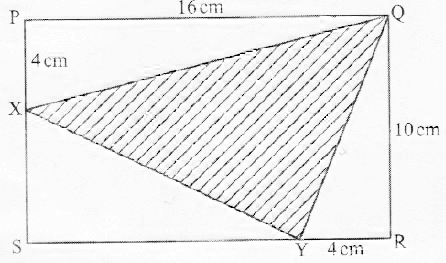
What is the area of the shaded part?- 88 cm2
- 72 cm2
- 36 cm2
- 32 cm2
- The area of one end of a cylindrical pipe is 8cm2. The pipe holds 4m3 of water. What is the legnth in metres, of the pipe?
- 500 000
- 50 000
- 5 000
- 500
- A tank had 2125 litres of water. The water was poured into a container which has a square base of side 250cm. What was the height of the water in the container?
- 34cm
- 340cm
- 3 400cm
- 34 000cm
- A school has enough food to feed 800 learners for 20 days. If 200 more learners were admitted to the school, how many days would the same food be able to feed all the learners?
- 25
- 16
- 5
- 4
- A lorry weighs 7200 kg when empty. It weighed 12.6 tonnes when loaded with some 90 kg bags of maize. How many bags of maize were loaded on the lorry?
- 140
- 80
- 60
- 20
- In the triangle shown, construct a perpendicular line from point P to meet line RQ at point W.
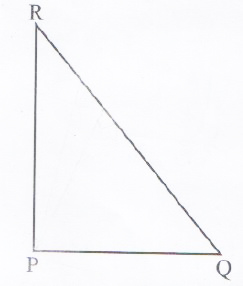
Measure the line RW. What is the length of line RW?- 7.8 cm
- 4.5 cm
- 3.9 cm
- 3.0cm
- The three angles of a triangle are x°, (x-4)° and (3x-1)°. What is the size of the smallest angle in the triangle?
- 31°
- 33°
- 37°
- 110°
- Which one of the following is true for both an equilateral triangle and a rectangle?
- All sides are equal.
- All angles are equal.
- All angles add up to 180°.
- All angles add up to 360°.
- John walked a distance of 9 km from home to the market. He then walked back home. The whole journey took a total of 3 hours.
What was the average speed for the whole journey?- 54km/h
- 18km/h
- 6km/h
- 3 km/h
- Two sisters shared sh 3 600 in the ratio 3:5.
What was the difference in the amount of money received by the sisters?- sh2250
- sh2160
- sh 1350
- sh 900
- The following lines have been constructed to meet at point X.
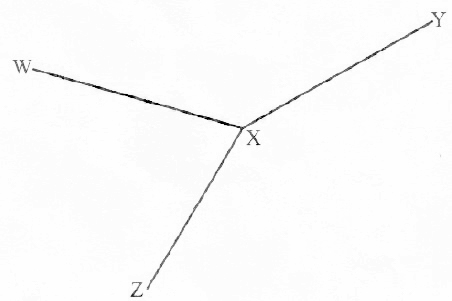
What is the measure of angle WXZ?- 75°
- 105°
- 135°
- 150°
- A salesperson is paid a monthly salary of sh 9000. She is also paid a commission of 10% for all the goods sold above sh 10000. In a certain month, her total earnings were sh 10500. What was the total sales of goods in that month?
- sh 15000
- sh 24000
- sh 25 000
- sh35 500
- A tourist travelled from Mombasa to Nairobi by bus. The bus left Mombasa at 1.45 p.m and took 9 ½ hours to arrive in Nairobi. What time in 24 hour clock system, did the bus arrive in Nairobi?
- 0415h
- 1115h
- 2215h
- 2315h
- A cylindrical tin has a diameter of 14 cm and a height of 30 cm. The curved surface of the tin is completely covered by a label. What is the area of the tin covered by the label?
(Take π = =22)- 660 cm2
- 1320 cm2
- 1628 cm2
- 4620 cm2
- The average mass of 40 pupils in a class was 41.8 kg. When the mass of the teacher was added, the average mass became 42.7 kg. What was the mass of the teacher?
- 42.25 kg
- 78.7kg
- 82.7 kg
- 88.7kg
- A cylindrical tank of radius 5 m and a height of 3.5 m is full of water. On a certain day, the level of water dropped by 14 cm after being used for irrigation. How many litres of water were used on that day?
(Take π = 22/7)- 11000
- 110000
- 1100000
- 11000000
- The figure shows a semicircle of radius 3.5 cm enclosed in a rectangle.
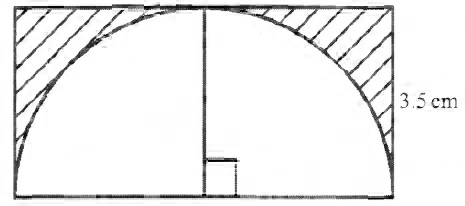
What is the area of the shaded part?
(Take π = 22/7)- 43.70 cm2
- 24.50 cm2
- 19.25 cm2
- 5.25 cm2
- Mercy has 5 bags of maize and Peter has 3 bags of maize. The mass of 1 bag of maize is represented by (x + 10) kg. Which one of the following expressions will show the total mass of maize that they have?
- (8x+80) kg
- (8x + 10) kg
- (5x+50) kg
- (3x+30) kg
- What is 1/4(32g+ 16f) + 1/3(15g + 9f) in the simplest form?
- 13g+f
- 13g + 7f
- 47g+f
- 47g+7f
- What is the value of
x² + y²
x - y
given that x =8 and y = 6- 7
- 14
- 50
- 98
- Using a ruler and a pair of compasses only, construct an equlateral triangle XYZ of side 7cm. Construct a circle passing through points X, Y and Z. What is the measure of the diameter of the circle?
- 2cm
- 4cm
- 6cm
- 8cm
- The following are properties of a certain quadilateral:
- Diagonals are equal.
- Diagonals bisect each other at 90°
- Has two pairs of parallel lines
- Interior angles are equal.
What is the name of the quadilateral described by the properties?- Square
- Rectangle
- Rhombus
- Parallelogram
- Mark bought a piece of land for sh 1 500 000. After some years, he sub-divided the land into 8 equal plots. He sold each plot at sh 350 000. What was the percentage profit made from the sale of all the plots?
- 10 5/6%
- 23 1/3%
- 46 3/7%
- 86 2/3%
- The table shows bus fare for adult passengers in shillings between different towns.
Town K 300 Town L 500 300 Town M 600 300 200 Town N 700 400 300 200 Town P
Amina and her two children travelled by bus from town K to P via N. The bus fare for children was half that of adults. How much money did Amina and her children spend as fare for the whole journey altogether- sh 1400
- sh 1600
- sh2000
- sh2400
- Nicholas paid sh 4000 for a carpet after getting a discount of 20%. What would have been the percentage discount had he bought the carpet for sh 3 800?
- 4%
- 24%
- 30%
- 76%
- Patel bought the following items from a shop:
- 3½ kg of maize flour @sh 90 per kg
- 2 loaves of bread for sh 110
- 5 packets of milk @sh 52
- 4 kg of rice @sh 69 per kg
He paid for all the items using a sh 1 000 note. How much more money should Patel give the shopkeeper so as to be given a balance of a sh 100 note?- sh961
- sh 161
- sh61
- sh 39
- The marked price of a radio was sh3 200. The hire purchase price was 115% of the marked price. Mutai bought the radio on hire purchase terms. He paid a deposit of sh 1680 and 4 equal monthly instalments. How much money was each monthly instalment?
- sh 500
- sh920
- sh 2000
- sh 3680
- A road measuring 1.5 km is represented on a map by a line measuring 7.5 cm. What is the scale of the map?
- 1:20
- 1:200
- 1:2000
- 1:20000
- The table shows postal charges for sending parcels.
A wholesaler sent three parcels weighing; 2 kg, 11 kg and 37 kg. How much money was the wholesaler charged for sending the parcels altogether?Mass (kg) Charges (sh) Up to 5 kg 235 Over 5 kg up to 10kg 290 Over 10 kg up to 15kg 375 Over 15 kg up to 30 kg 525 For each additional 1 kg or part thereof up to 50 kg 19 - sh 905
- sh 1135
- sh 1268
- sh 1313
- The sitting capacity of a matatu was decreased from 14 passengers to 11 passengers. What was the percentage decrease in the sitting capacity?
- 21 3/7%
- 27 3/11%
- 72 8/11%
- 78 4/7%
- Oleluko earns a salary of sh 14 400 every month. He spends sh 7 200 on food, sh 4 000 on house rent, sh 2 160 on airtime and saves the rest. A pie chart was drawn to show how Oleluko spent his salary. What was the size of the angle that represented the savings?
- 26°
- 54°
- 100°
- 180°
- The figure shows an incomplete stack of cubes
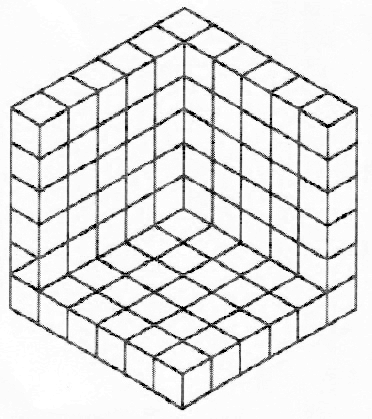
How many cubes are in the stack?- 216
- 125
- 108
- 91
- Atieno deposited sh 4 800 in a bank. The bank paid simple interest at the rate of 12% per annum. How much money did she have in the bank at the end of nine months?
- sh432
- sh576
- sh 5232
- sh5376
- What is the value of x in
3(x+8)=4(x+4)?- 20
- 8
- 4
- 3
- Which one of the following nets will form a triangular prism?
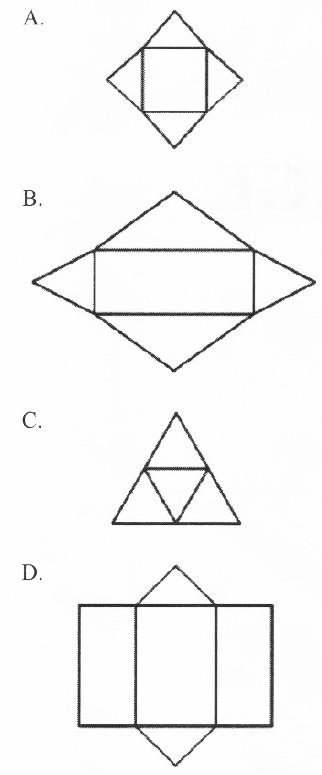
Marking Scheme
|
|
|
|
|
Kenyan Folk Dances - Music CBC Grade 6 Notes
Kenyan Folk Dances
- Dancing is the response to music by moving appropriate body parts as shoulders, head, waist, legs and hands.
- Folk means people
- Folk dances are performed to mark events in the society such as harvesting, initiation marriage, funeral and birth
Components Of A Folk Dance
- Songs
- Message
- Body movements
- Formations
- Instruments
- Costumes
- Body adornments
- Ornaments
- props
Social Benefits Of Folk Dances
- Help people have knowledge respect and value their traditions and customs
- Help people learn about each other’s culture
- Promote peace unity and respect among Kenyans communities
- Help people come together and make friends as they get entertained
- They help individuals to express themselves as they play different roles in a folk song
- Engaging folk dances people use their leisure time positively. This prevents them from engaging in bad habits such as drug abuse and idleness.
Economic Benefits Of Folk Dances
- Help our county earn foreign exchange through the tourist who visit the county to watch folk dances and see wild animals
- Some people earn living by performance folk dances and working in cultural centres
- It is a source of self-employment to people who have talents in performing folk dances
Appreciation Of Kenyan Folk Dance
| FOLK DANCE | COMMUNITY | INSTRUMENT | OCCASSION | Performance | Dancing style | FORMATION | COSTUME |
| Ribina | Kisii | Chinchingiri -shakers Ekonu drum |
Entertainment enjoyment |
Old men and women | |||
| Risanga | Kisii | obokano | During communal work Eg weeding |
Men and women | |||
| Ramogi | Luo | Abu, horns, bull drums |
entertainment | Boys and girls | |||
| Owalo | Luo | drums | entertainment | Married women | circular | Sisal skirts | |
| Otenga | Luo | nyatiti | Men and women | Chest and shoulders are moved | |||
| Ibirandi | Kuria | egetono | Wedding ceremony | Elders, boys and girls | |||
|
Teroburu |
Luo | Drum Gara-leg rattles Horn - oporo |
Burial ceremony for entertainment |
Young men | Shaking of waist, arms and shoulders | Circular around horn blower | Sisal skirt |
| Entabanana | Kisii | Obokano Drum - ekoro |
entertainment | Both men and women | Shaking of shoulders, jumping |
circular | Sisal skirt |
Western Musical Instruments - Music CBC Grade 6 Notes
Descant Recorder
Playing The Scale Of C Major
- A C major scale consist of the notes C D E F G A B C.
- The scale of C major starts with C and ends with C1.
- All the notes of the scale of C major can be played on the descant recorder.
Playing The Notes C And C1
- To play note C on the descant recorder, cover the hole with your fingers
- Back hole – left thumb
- 1st hole from the top – the left index finger.
- 2nd hole from the top – the left middle finger.
- 3rd hole from the top – the left ring finger.
- 4th hole from the top – the right index finger.
- 5th hole from the top – the right middle finger.
- 6th hole from the top – the right ring finger.
- 7th hole from the top – the right little finger.
- The right hand thumb should be used to support the descant recorder.
- Note C has a low sound or pitch.
Note C1
- To play note C1 cover the second hole from the top with your left hand’s middle finger and the back hole with your left thumb.
- All other holes should remain open.
- The right hand thumb should support the descant recorder
- Note C1 and C are different in pitch.
- The pitch of C1 is high while C is lower. C1 is called higher C
Playing The Lower D And D1
- To play note D the descant recorder, cover holes from the top with fingers except hole seven
- Back hole – left thumb
- 1st hole from the top – the left index finger.
- 2nd hole from the top – the left middle finger.
- 3rd hole from the top – the left ring finger.
- 4th hole from the top – the right index finger.
- 5th hole from the top – the right middle finger.
- 6th hole from the top – the right ring finger.
- The right hand thumb should be used to support the descant recorder.
- Hole seven is not covered when playing note D
Note D1
- To play note D1 cover the second hole from the top with your left hand’s middle finger and the back hole open.
- All other holes should remain open.
- Move the left thumb slightly below the back hole to support the recorder together with the right hand thumb..
- The pitch of D1 is high while D is lower. D1 is called higher D
Playing Note E
- To play note E on the descant recorder, cover all the hole from the top except holes six and seven with your finger
- Back hole – left thumb
- 1st hole from the top – the left index finger.
- 2nd hole from the top – the left middle finger.
- 3rd hole from the top – the left ring finger.
- 4th hole from the top – the right index finger.
- 5th hole from the top – the right middle finger.
- The right hand thumb should be used to support the descant recorder.
- The sixth and seventh hole are open.
Playing Note F
- To play note F on the descant recorder, close the top four holes with your fingers
- 1st hole from the top – the left index finger.
- 2nd hole from the top – the left middle finger.
- 3rd hole from the top – the left ring finger.
- 4th hole from the top – the right index finger.
- 6th hole from the top – the right middle finger.
- 7TH hole from the top – right little finger.
- The right hand thumb should be used to support the descant recorder.
NOTE; all holes are closed except the 5th hole from the top.
- Playing the scale of C major ascending and descending.
- The scale of C major is made up of motes C D E F G A B C1.
- The mark on the last note C1 indicates a higher C
- When playing the major scale is played note after note, that is from C to C1 it is played in ascending. The pitch of each note becomes higher towards the higher C.
- When the major scale is played note after note, that is from C1 to C is played in descending. The pitch of each note becomes low becomes low as you move towards C
Playing Simple Melodies On The Descant Recorder
Song: Old Mac Donald had a farm
| Old MACDONALD had a farm E-I-E-I-O And on his farm he had a cow E-I-E-I-O With a moo moo here And a moo moo there Here a moo, there a moo Everywhere a moo moo Old MacDonald had a farm E-I-E-I-O Old MACDONALD had a farm E-I-E-I-O And on his farm he had a pig E-I-E-I-O With a oink oink here And a oink oink there |
Playing The Kenyan National Anthem On A Descant Recorder
| Ee Mu - ngu ngu -vu ye - tu D1 D1 D1 C1 G A I le te ba ra ka kw etu D1 D1 D1 C G A A Ha ki i we nga o na mli nzi A A A A D1 C1 A A G Na tu ka e na u nd ugu D1 D1 C1 C1 G G A E A ma ni na u hu ru E A A G G A F Ra ha tu pa te na u sta wi E A A A A G G A A. |
Playing The Descant Recorder In A Duet
Playing in a duet
SONG: Baa, baa, black sheep
| Baa, baa, black sheep, have you any wool? Yes, sir, yes, sir, three bags full One for the master and one for the dame One for the little boy who lives down the lane Baa, baa, black sheep, have you any wool? Yes, sir, yes, sir, three bags full One for the master and one for the dame |
Kenyan Indigenous Musical Instruments - Music CBC Grade 6 Notes
String Instruments
Fiddle
Parts Of A Fiddle And Their Functions
Tuning A Fiddle
Care And Maintenance Of String Instrument
Techniques Of Playing String Instruments
Making Of A Fiddle(project)
Playing In An Instrumental Ensemble
String Instruments
- Are musical instruments that have strings.
- Produce sound by
- Plucking
- Strumming
- Rubbing the strings
- String instruments can have one, two or more number of strings.
- A string instrument with one or two strings is called fiddle.
- There different types of string instruments found among the Kenya communities.
- Each instrument has specific community of origin.
String Instrument Community Of Origin 1 Shiriri or ishiriri or silili Abaluhya 2 Litungu Abaluhya 3 Limoyi Abaluhya 4 Ongengo Abagusii 5 Obokano Abagusii 6 Nderemo Agikuyu 7 Wandindi Agikuyu 8 Entono Abakuria 9 Ekegogo Abakuria 10 Iritungu Abakuria 11 Orutu Luo 12 Uta Mijikenda 13 Uta wa wathi Akamba 14 Mbeve Akamba 15 Adeudeu Iteso 16 Mwazigizi or zeze Taita 17 Kimengeng Kalenjin 18 Pukan Pokot 19 Chepkongo/chemonge Kipsigis 20 Nyatiti Luo Luo Fiddle
Fiddles are string instruments that have one or two strings
Fiddle Community 1 Orutu Luo 2 Mbeve Akamba 3 Ekegogo Abakuria 4 Mwazigizi or zeze Taita 5 Ageregeret Iteso 6 Ishiriri Abaluhya 7 Wandindi Agikuyu 8 Kimeng’eng’ Kalenjin 9 Ong’eng,o or Otete Abagusii
Parts Of A Fiddle And Their Functions
- Arm/neck - for holding and supporting the instrument when playing it.
- String -it is plucked or strummed to produce sound.
- Resonator - makes the sound louder.
- Membrane/skin - used to cover the resonator.
- Bridge - used to make the sound clearer by separating the string from the skin or membrane.
- Tuning peg - used to loosen or tightening the strings to produce the desired sound.
- Bow - used to play the instrument.
Tuning A Fiddle
- Tuning is the process of adjusting the pitch of one or many tones of a musical instrument or getting it ready so that it is played it will sound at the correct pitch.
- String instruments are tuned to produce the desired sound.
To tune a fiddle, identify the string and also identify the sound that you desire to produce. - A fiddle can be tuned by
- Loosening the tuning peg
- Tightening the tuning peg
Care And Maintenance Of String Instrument
- Dust the parts of the instruments using a piece of cloth. Handle the string with care
- Always use the arm of the instrument when carrying it.
- Always check your string instrument before playing it
- Replace word out or damaged parts of a string instrument
- Store it in a dry place free from dust and moisture
- Keep your instrument away from dust by putting it in a protective bag
- String instrument can be stored by hanging them on a wall or placing them in a cool and dry place where people cannot step on them.
- Avoid storing your instrument near walking paths because people passing by may knock them.
NB: when string instrument are cared for and maintained well, they last longer and produce good sound.
Techniques Of Playing String Instruments
- Bowing
Rubbing the instrument using a bow.
Bow: is made using a sisal thread tied on both ends of curved stick.
Types of musical bow
- Groud bow- eg. Nderemo by Kikuyu
- Mouth bow- eg Obokano by Kuria
- Hunters bow- eg Entono by Kuria
- Plucking
- Involves pulling and releasing the string using the fingers.
- Holding
- Every string instrument has a specific way in which it is held when playing.
- When a string instrument is not properly held when playing, it may not produce the desired sound.
Making Of A Fiddle(project)
- Collect tools and materials
- Making the arm or neck
- Fixing the tuning peg
- Preparing the resonator
- Fixing the arm or neck to the resonator
- Fixing the string
- Preparing the bridge
- Preparing the bow
- Tuning and play to test
Appreciating The Role Of A String Instruments
Playing In An Instrumental Ensemble
- An ensemble is a group of people who performs instrumental or vocal music together instruments being played together
- An instrumental ensemble consists of a group of instruments being played together
- An instrument can be percussion instruments, winds instruments or string instruments
Kenyan Folk Songs - Music CBC Grade 6 Notes
- Types of Kenyan Folk Songs
- Diction In Folk Songs
- Features Of Folk Songs
- Importance Of Performing Folk Songs From Diverse Communities In Kenya
Types of Kenyan Folk Songs
- Folk songs are traditional songs performed during different occasions by different communities
- They are performed by a common people of a region in a local language
- There different types of folk songs:-
- Naming folk songs
- Worship folk songs
- Marriage folk songs
- Initiation folk songs
- Work fork songs
- Funeral folk songs
- Solo folk songs
- Naming folk songs
- Are performed to celebrate the birth of a child.
- They welcome a new member to the family and society at large.
- Performed as a way of thanks giving to God for a new life.
- Are sung to congratulate the parents for bringing a new life to the world.
- They educate the parent on how to take care of the newborns.
- Example- mwana wa mberi from luhya community
- Worship folk songs - Are performed during religious ceremonies in different places of worship
- They are used to
- Educate believers about god
- Praise god
- Entertain the worshippers
- Encourage and give hope to the worshippers
- Example- roho maler
- They are used to
- Marriage folk songs - Marriage folk songs are performed during marriage ceremony.
- Are sung to praise the bride and the groom.
- Educate the newly married couple on values in marriage such as love faithfulness and hard work.
- Are sung to entertain people during marriage ceremonies.
- Example ekio nkiekio
- Initiation folk songs - Are songs are sung during transaction from one stage of life to the next.
-
- They educate the initiates on the morals they are expected to uphold.
- They promote good behaviour among the young people.
- They encourage the initiates to be brave.
- Teach the initiates on traditions and expectations of the community.
- They entertain people during the initiation ceremony.
Example-
-
- Work folk songs - Are folk songs performed when people are doing different types of work such as farming, grazing cattle, building
- Encourage and motivate workers
- They also entertain the workers
- Example- wakariru by gikuyu community
- Funeral folk songs - Performed when mourning the death of a loved one.
- Help people to come together and celebrate the life of the dead.
- They console the family who have lost a loved one.
- They help people heal from the pain of losing a loved one.
- Solo folk songs - Are performed by one person
- A solo folk song performance can be accompanied by
- Dancing
- Musical instruments
- The performer can also wear appropriate costumes and decorate his or her body with adornments and ornaments
- A solo folk song performance can be accompanied by
Diction In Folk Songs
- Diction refers to the proper pronunciation of words when singing. To get good diction you should
- Pay attention to the vowels and consonants in the words
- Pronounce all the endings of the words in the folk songs
- Have good breath control during singing
Features Of Folk Songs
- Mood
- Climax
- Structure
- Vocal ornamentation
- Message
Importance Of Performing Folk Songs From Diverse Communities In Kenya
- It helps in cultural preservation
- Promotes national unity
- It is a source of employment
- Attracts tourist
- Folk songs entertain the audience
- Educate people on moral and values
Performing Songs - Music CBC Grade 6 Notes
- Phrasing
- Voice Blending
- Performance Cues
- Singing In A Duet
- Singing In A Trio
- Messages And Values In Song
- Social Economic Importance Of Songs
Phrasing
- A phrase is a musical sentence or idea.
- Phrases in music indicate where to take a short breath when singing.
- Do not breathe in the middle of a musical sentence because it will interrupt the flow.
- In order to sing whole phrase, you need to have enough breath.
- Take short breath only at the end of a musical phrase.
- Example of a song
Ee Mungu nguvu yetu
Ilete baraka kwetu
Haki iwe ngao na mlinzi
Na tukae na udugu
Amani na uhuru
Raha tupate na ustawi.
Voice Blending
- Voice blending is singing with unified sound.
- When performing in a group, it is advisable to balance your voices
- To sing with a good voice blend, ensure that you:
- Sing confidently
- Start and stop at the same time when singing in a group
- Sound the vowels and consonants appropriately.
- Sing at the same volume with others.
- Sing at the same speed as others singers.
- Sing the same pitch with others.
- Example of a song
See Saw Margery Daw,
Jacky shall have a new master;
Jacky shall earn but a penny a day,
Because he can't work any faster.
Performance Cues
- Performance cues are directions given to the performer to guide their performance.
- Performance cues include soft, loud, fast, slow crescendo and diminuendo.
- Crescendo means gradually getting louder or gradually increasing the volume.
- Diminuendo means getting softer or gradually decreasing the volume.
- When performance cues are gradually followed the music becomes interesting.
- Performance cues also bring out the mood of a song and improves the voice.
- Example song
Rain, rain, go away Come again another day
We want to go outside and play Come again another
day
Rain, rain, go away Come again another dayWe want to go outside and play Come again another
day
Rain, rain, go away Come again another dayWe want to go outside and play Come again another
day
Singing In A Duet
- A two part song is a song sang in two different voice part.
- A duet is a two-part song performed by 2 people each singing a different voice part.
- The voices that sing in a duet may include:
- Soprano/alto
- Tenor/bass
- Soprano/bass
- Soprano/tenor
- Alto/bass
- Alto/tenor
- When performing in duet remember to express the mood of the song always appropriately.
- Always keep to your voice as you sing a duet.
- When 2 performers sing in 2 different voice parts together they create harmony.
- Example of a song
Goosey goosey gander,
Whither shall I wander?
Upstairs and downstairs
And in my lady’s chamber.
There I met an old man
Who wouldn’t say his prayers,
So I took him by his left leg
And threw him down the stair
Singing In A Trio
- A three-part song is a song in three different voice parts.
- A trio is a three-part song by three people each singing a different voice part.
- The voice parts in a trio may include:
- Saprano1, soprano 2 alto
- Tenor 1 tenor 2 and bass
- Soprano, alto and bass
- Soprano alto and tenor
- When performing in trio remember to express the mood of the song always appropriately.
- Always keep to your voice as you sing a trio
- When 3 performers sing in 3 different voice parts together they create harmony
- When performing in trio you should ensure that
- You observe the correct pitch
- You follow the rhythm correctly
- You maintain the correct tempo of the song
- You follow the performance dynamics
- Example of a song
Ring-a-ring-a-rosies
A pocket full of posies
A tissue, a tissue
We all fall down
The king has sent his daughter
To fetch a pail of water
A tissue, a tissue
We all fall down
The robin on the steeple
Is singing to the people
A tissue, a tissue
We all fall down
The wedding bells are ringing
Messages And Values In Song
- Different songs have different messages and values.
- Always listen to and sing songs with values and educative messages.
- Values in songs include responsibility, respect love unity patriotism, social justice and integrity.
- Educative messages include those that promote peace, encourage helping the needy and encourage hard work.
Social Economic Importance Of Songs
- Songs are very important to the society and to an individual
- The social importance of songs include:
- Promoting peace and unity among people
- Teaching about morals and valuesin society and discouraging vices in the society
- Entertainment
- Passing a certain message to people in the community
- Warning people against bad behaviour
- Prasing people for good deeds such as environment conservation
- Economic importance include
- Musician get paid when they perform in events or concert
- Musicians record music and sell it to get money
- Musicians earn money when songs are downloaded from various digital sources
- Music earn the country revenue


